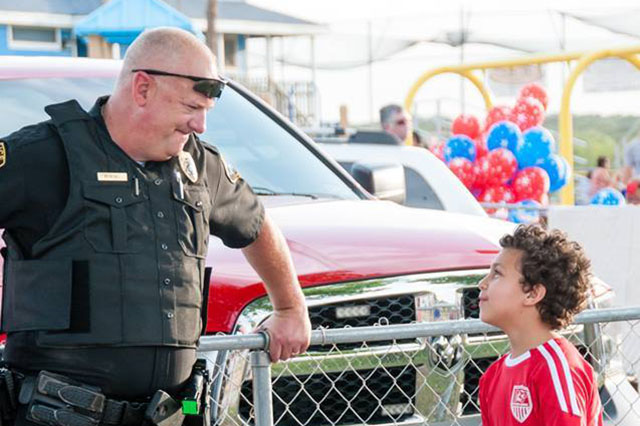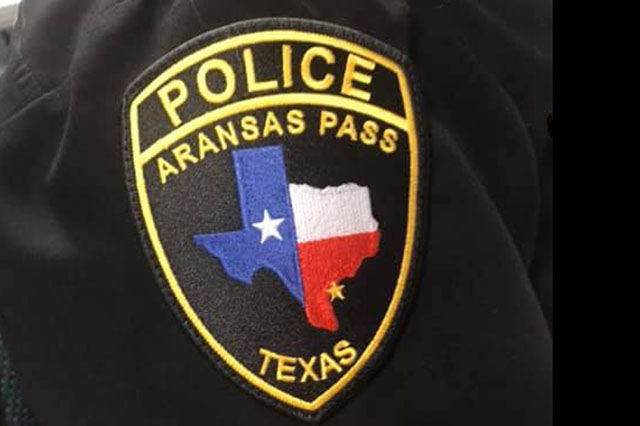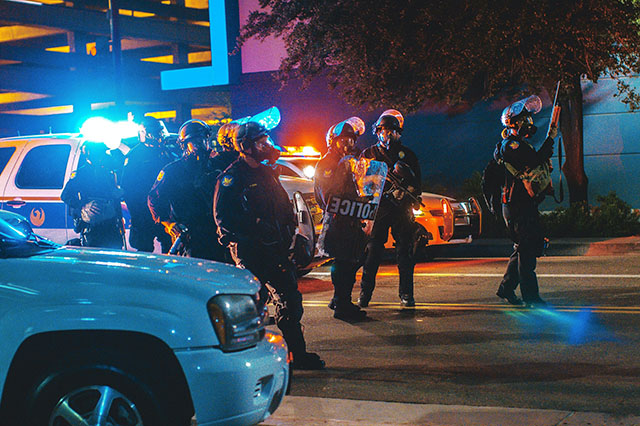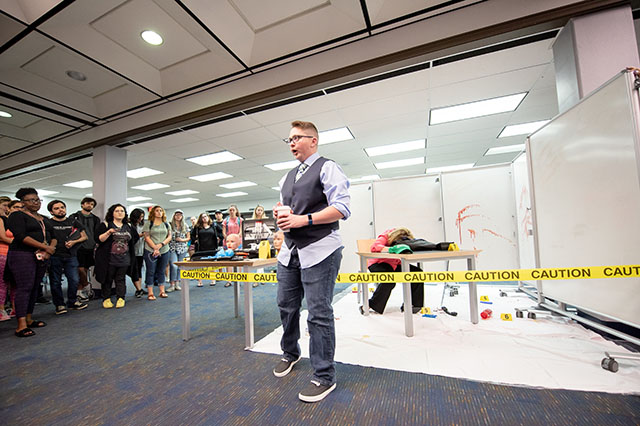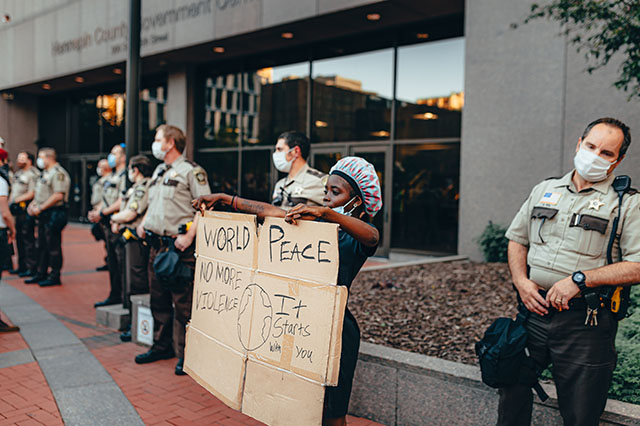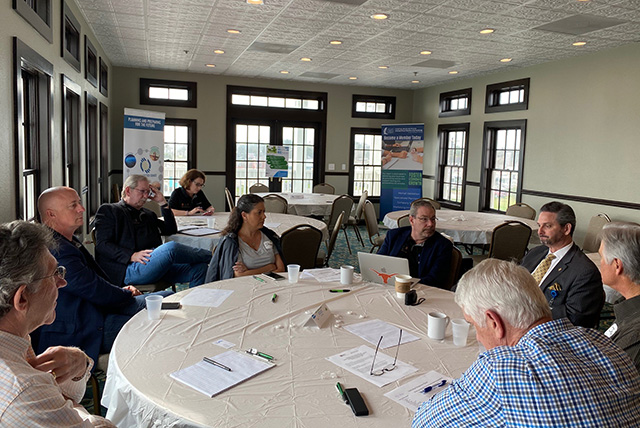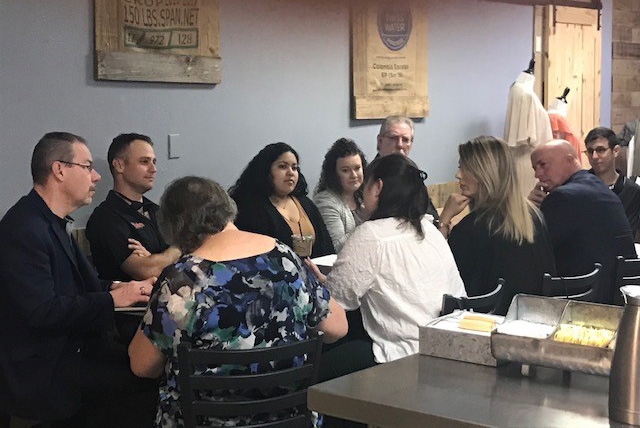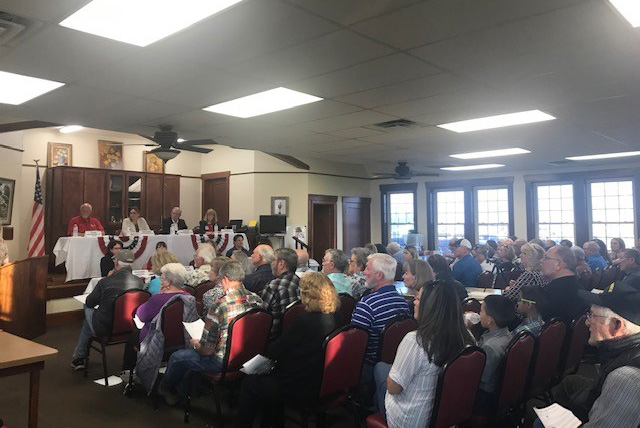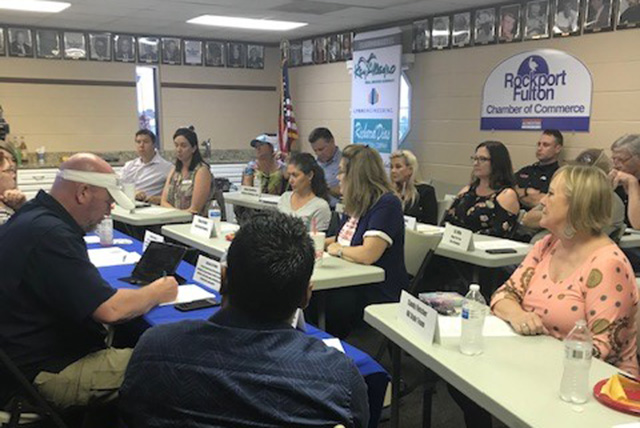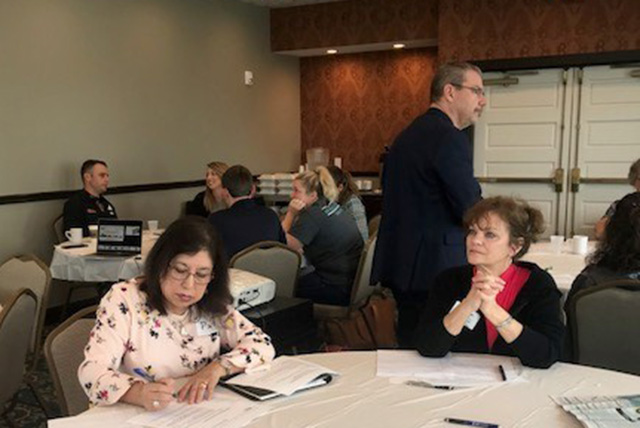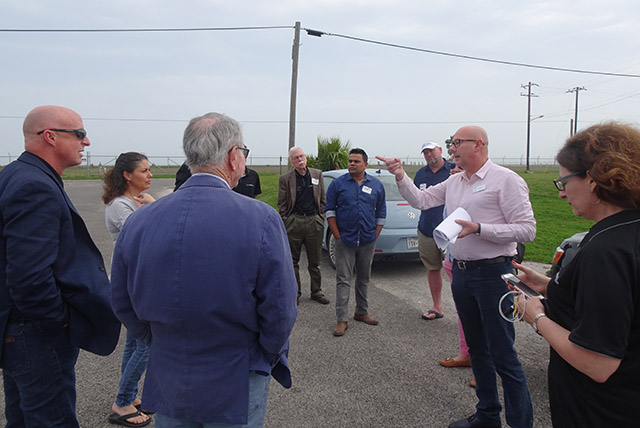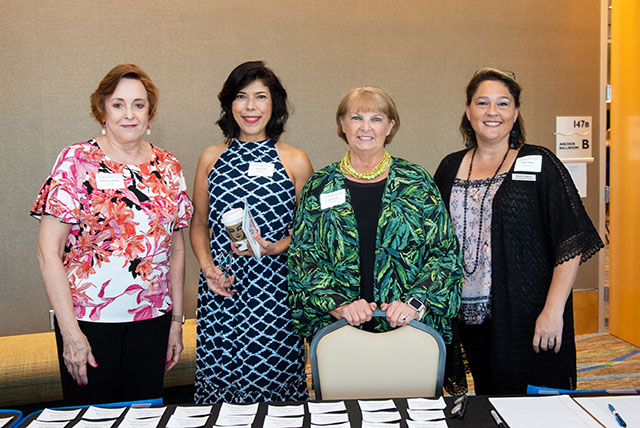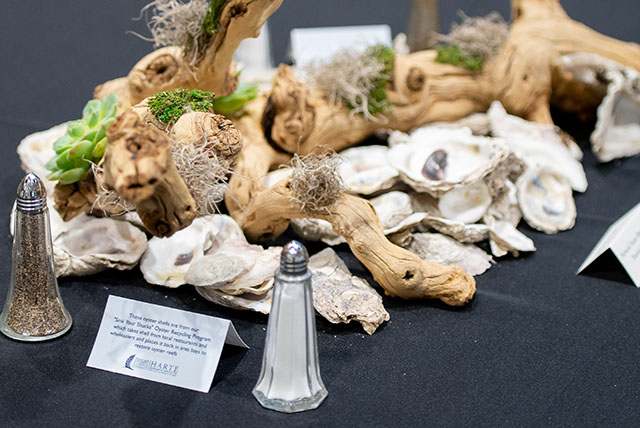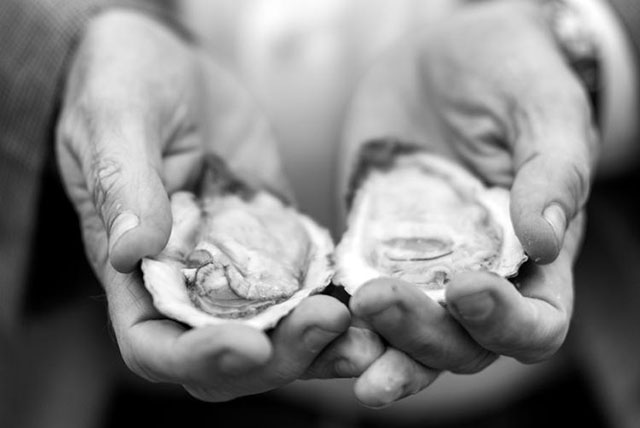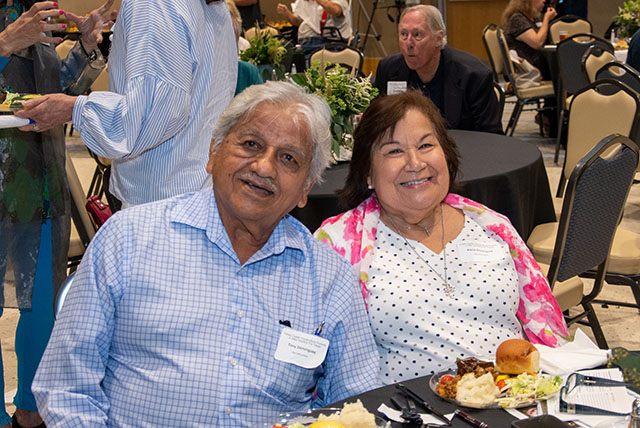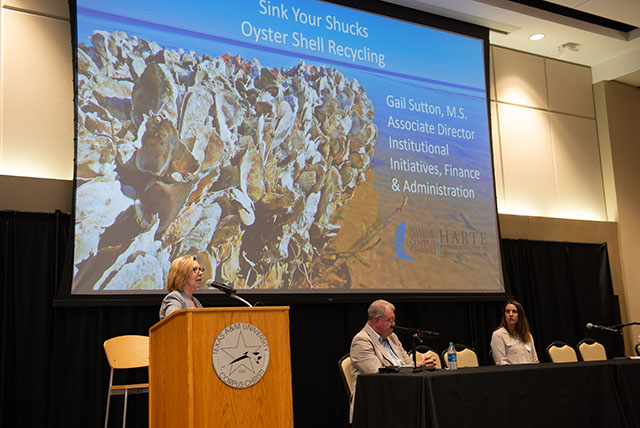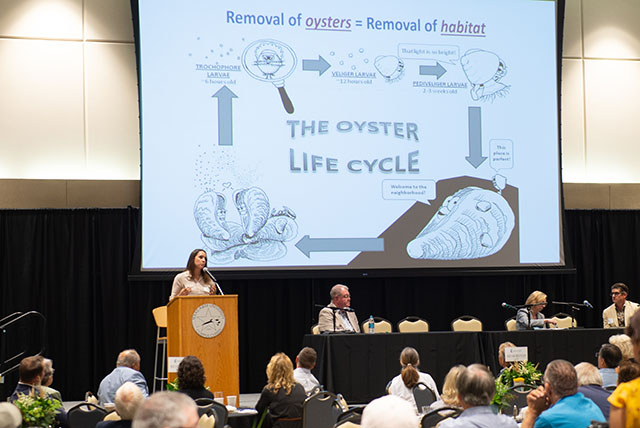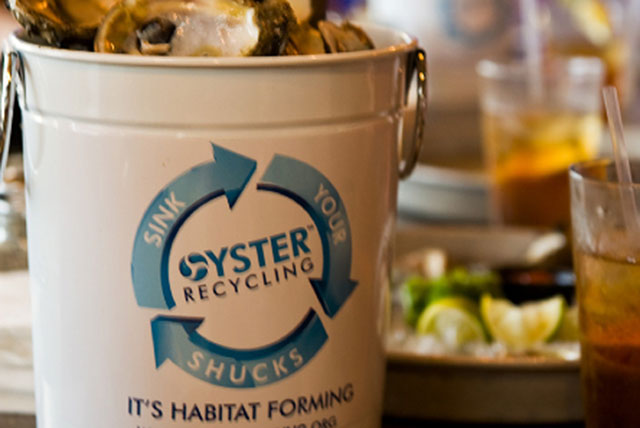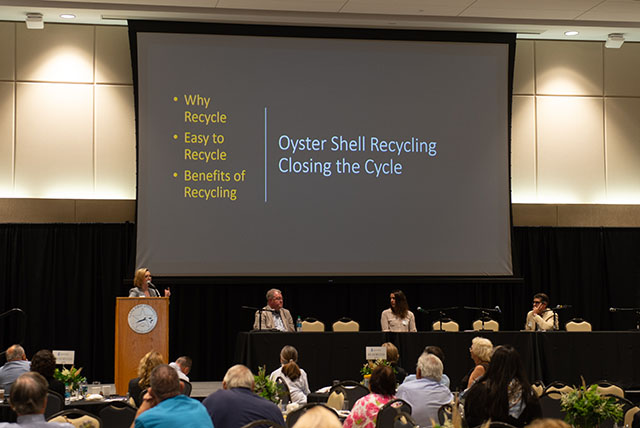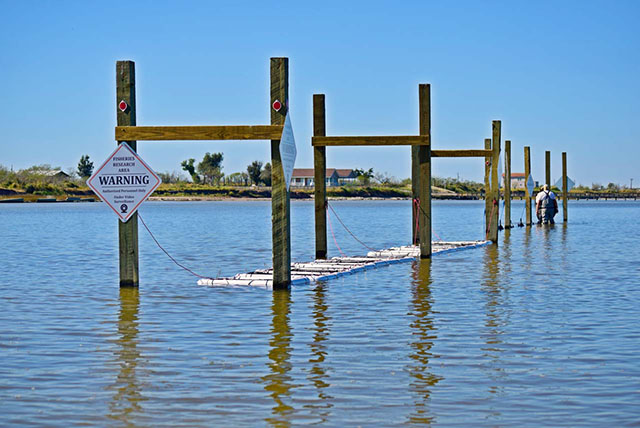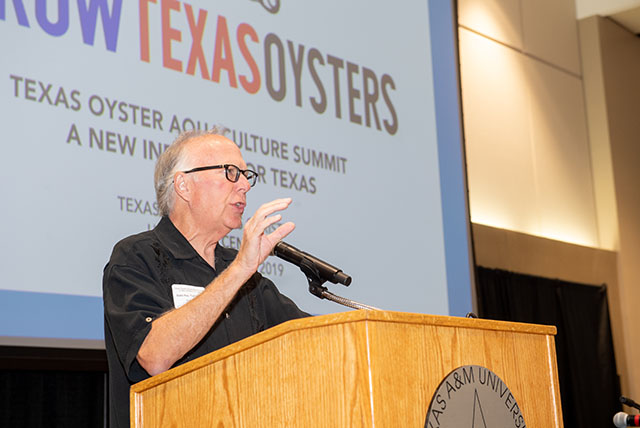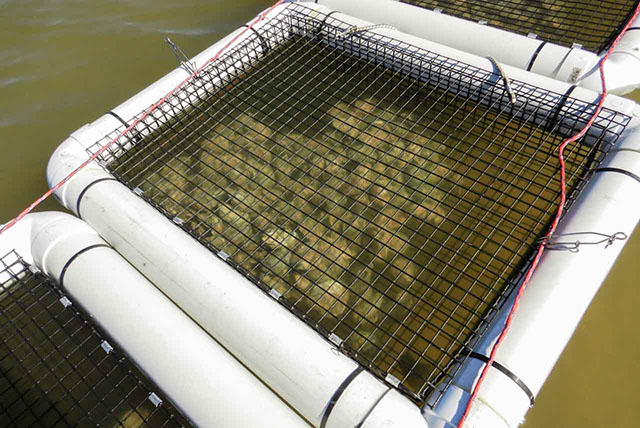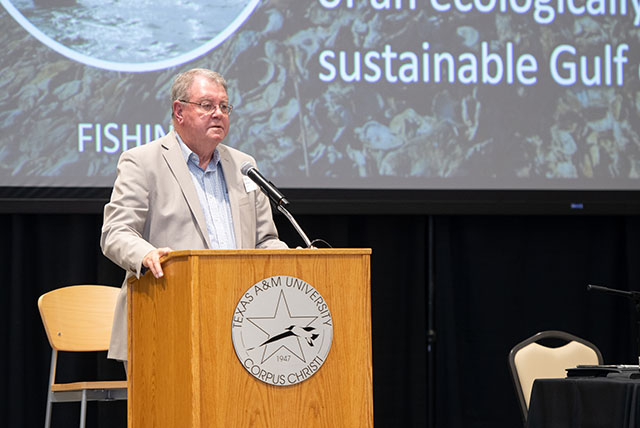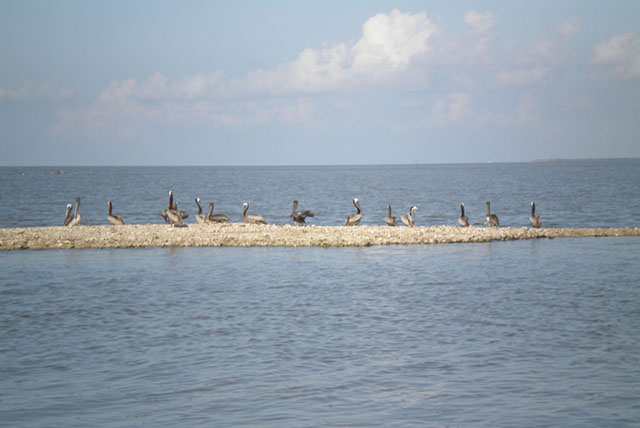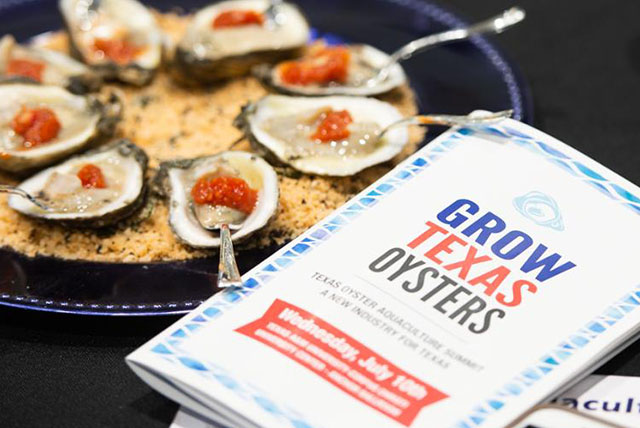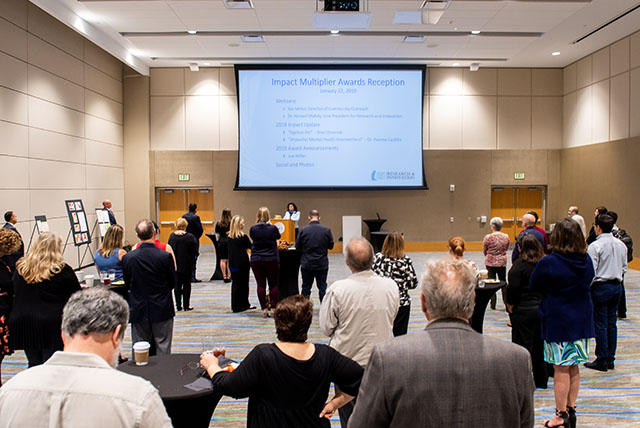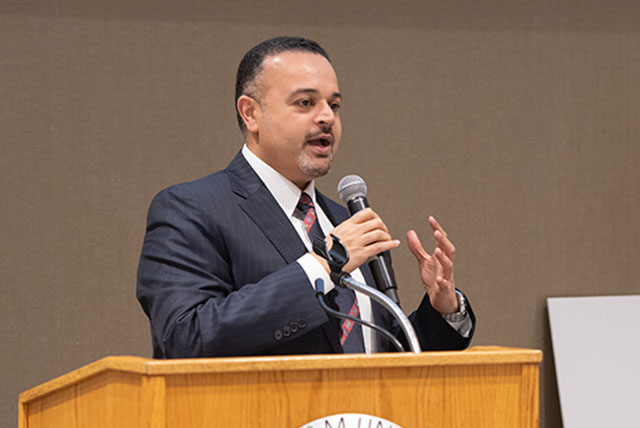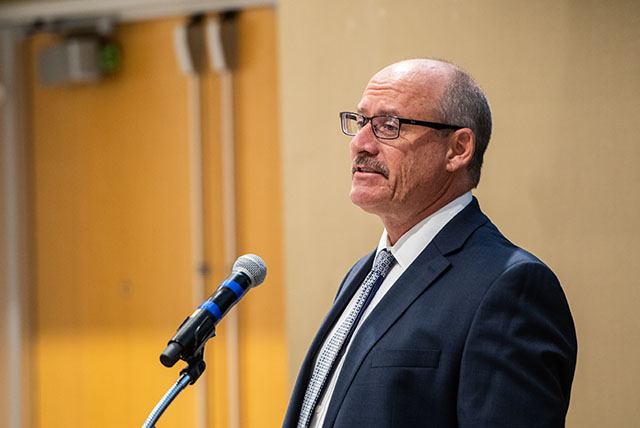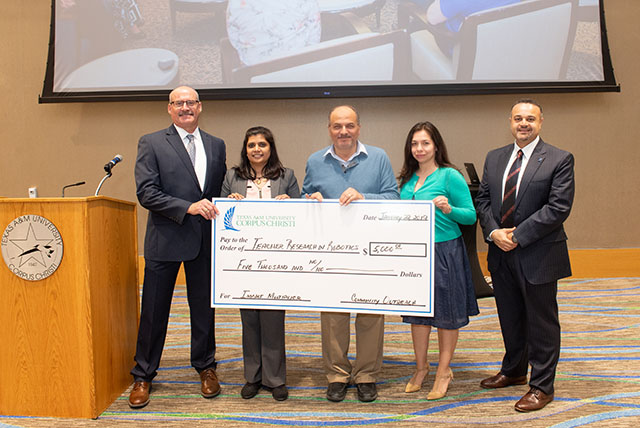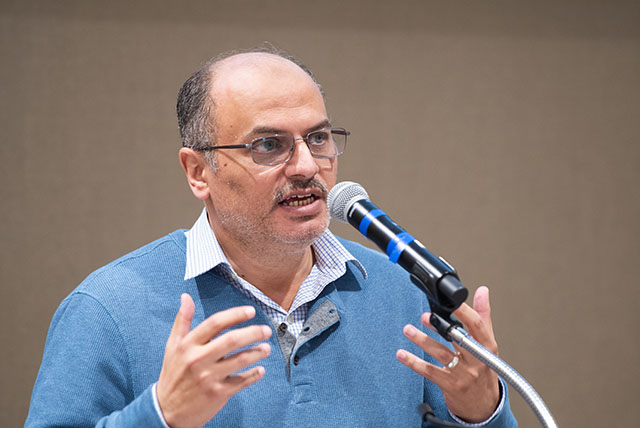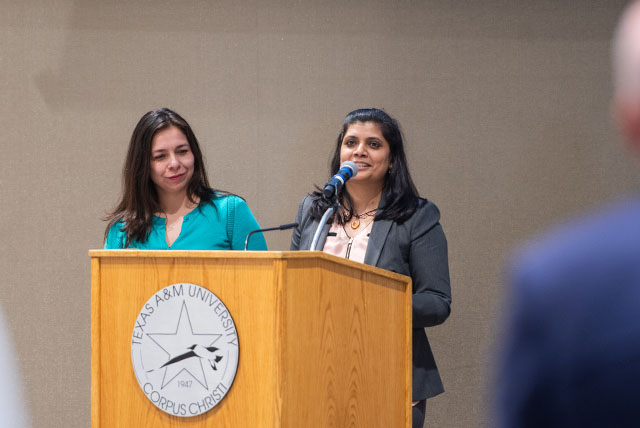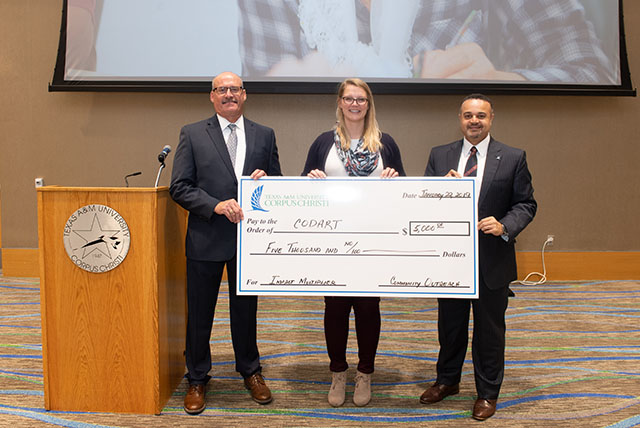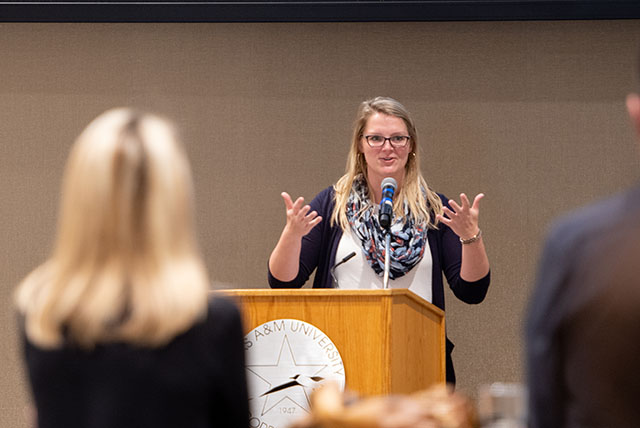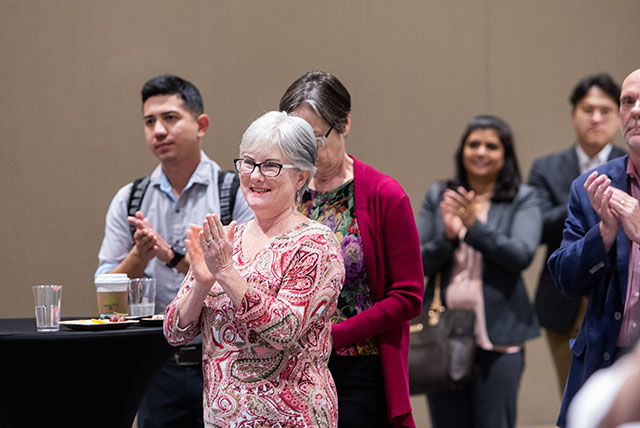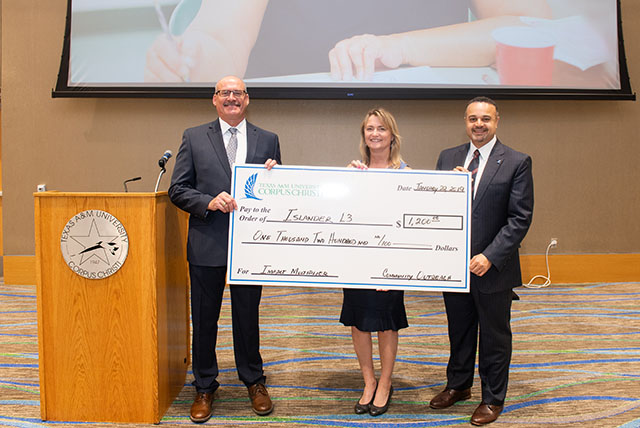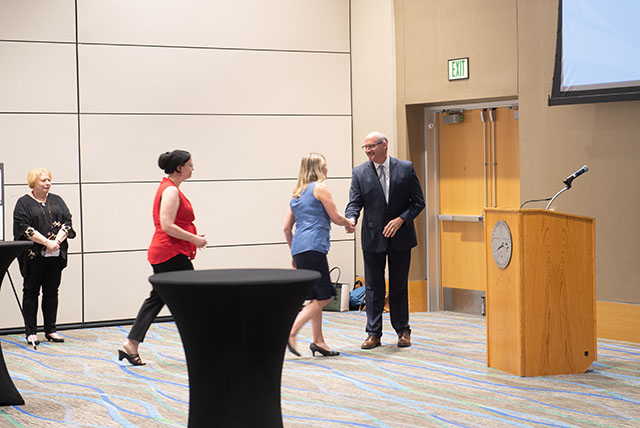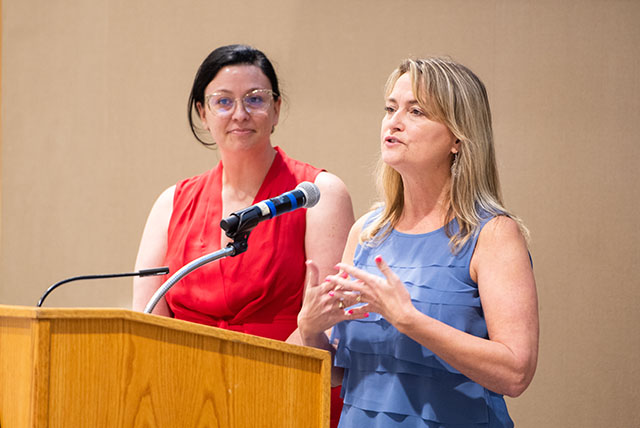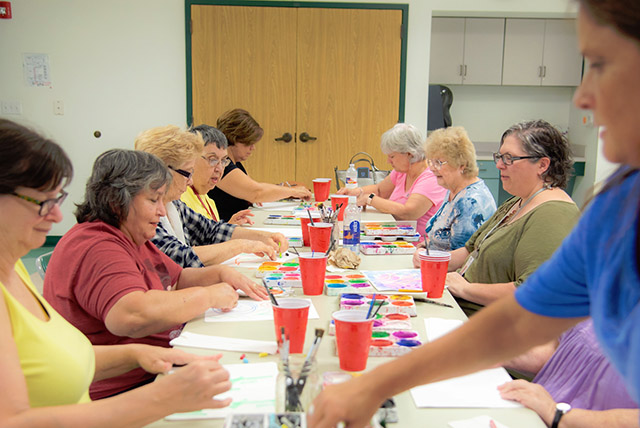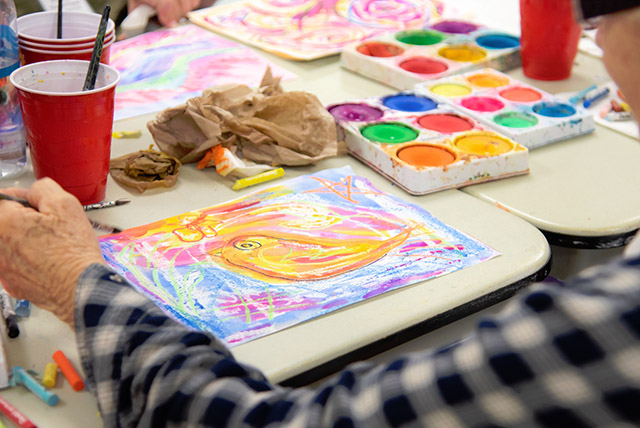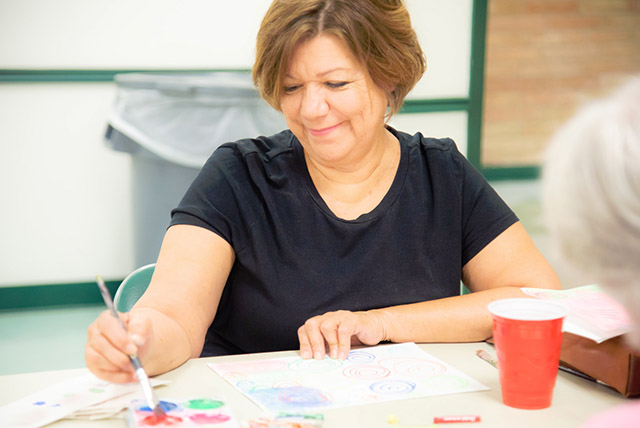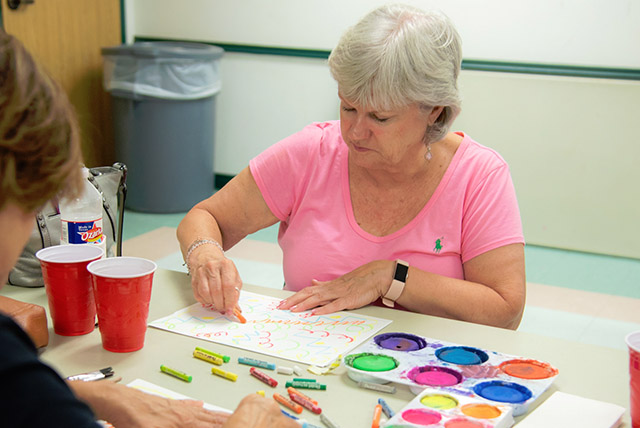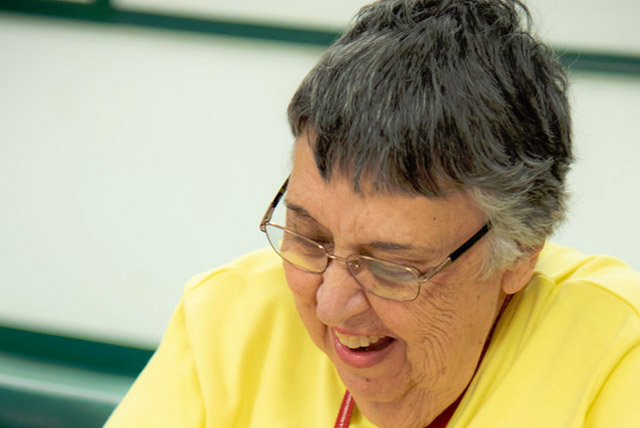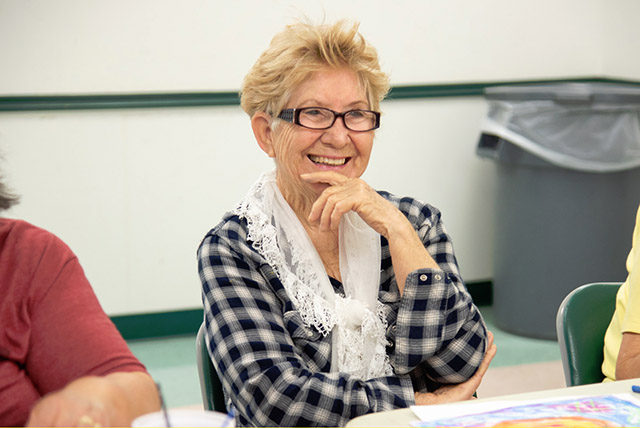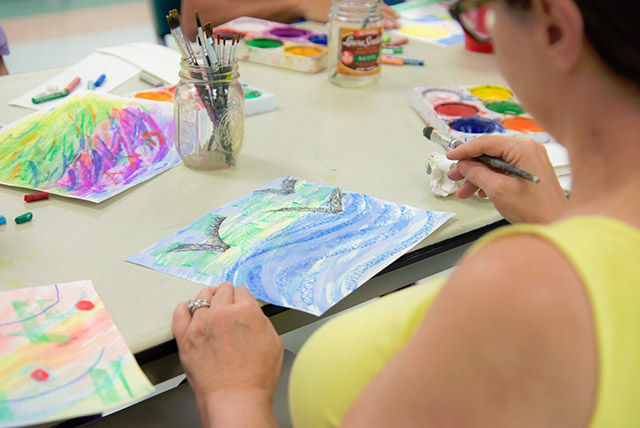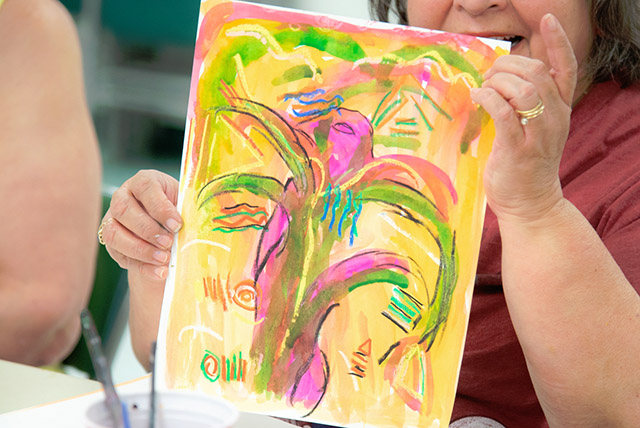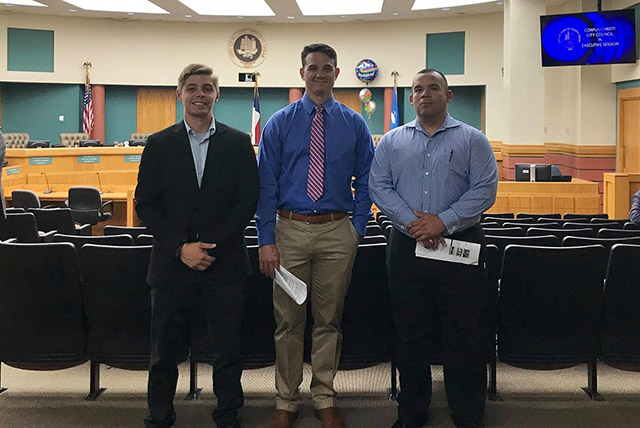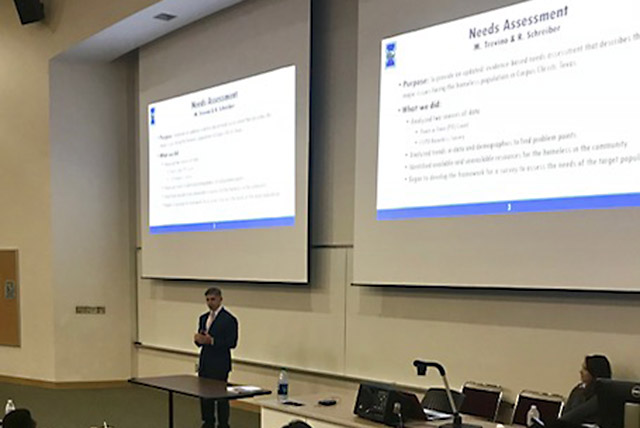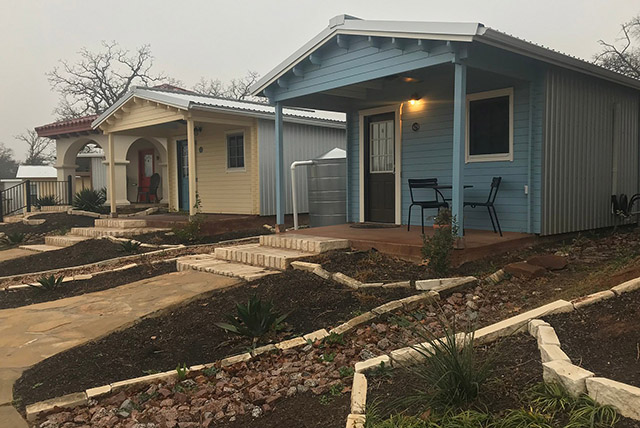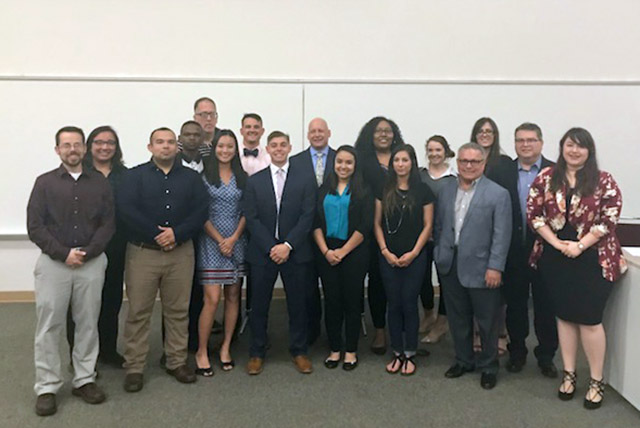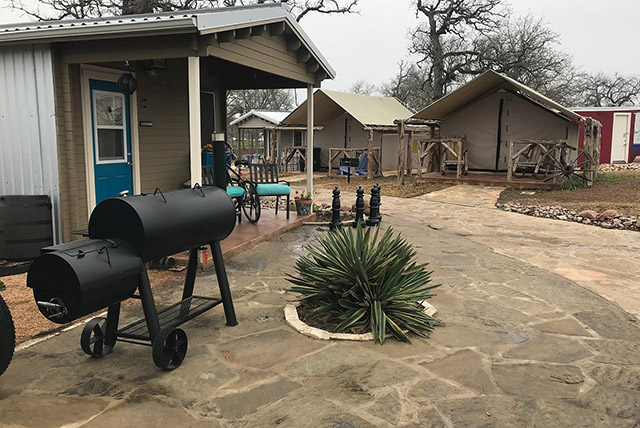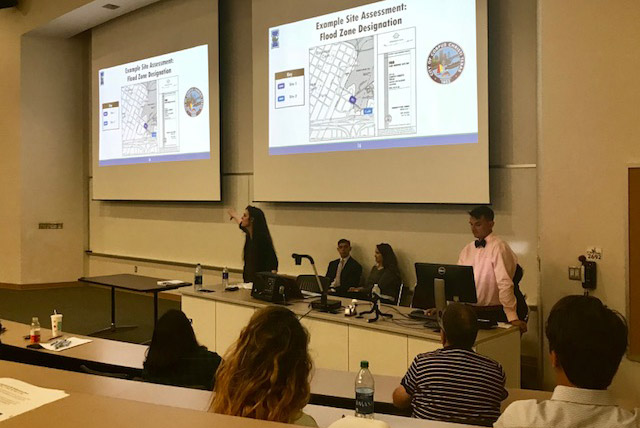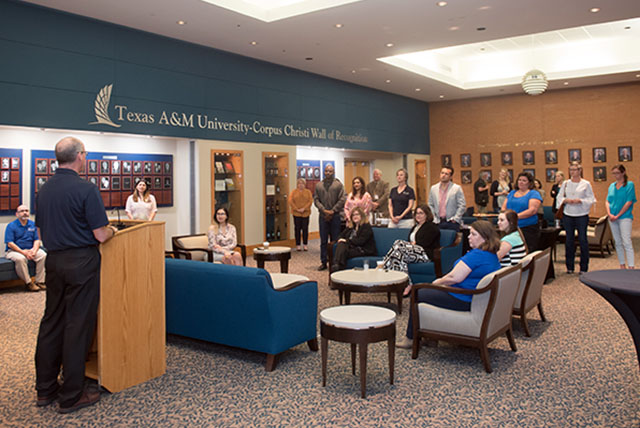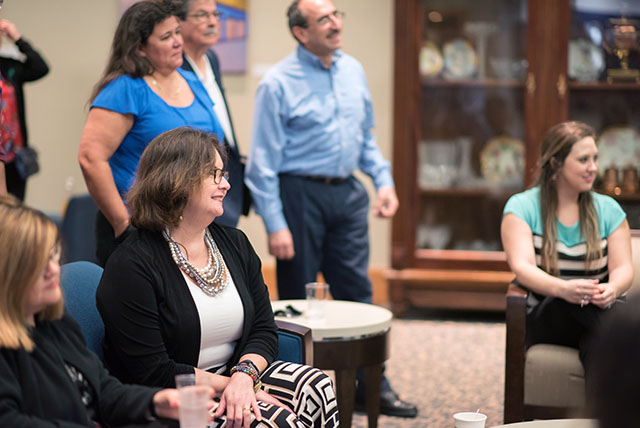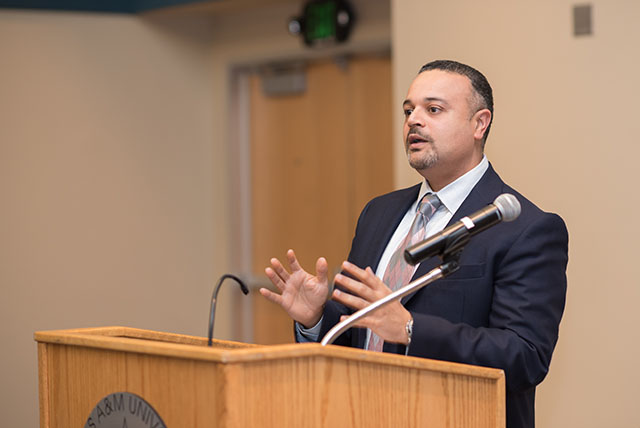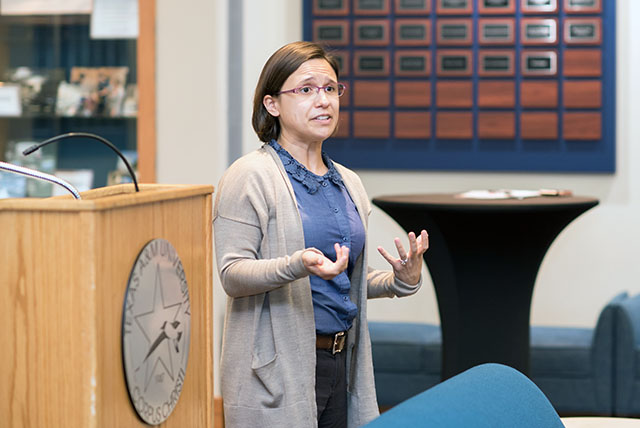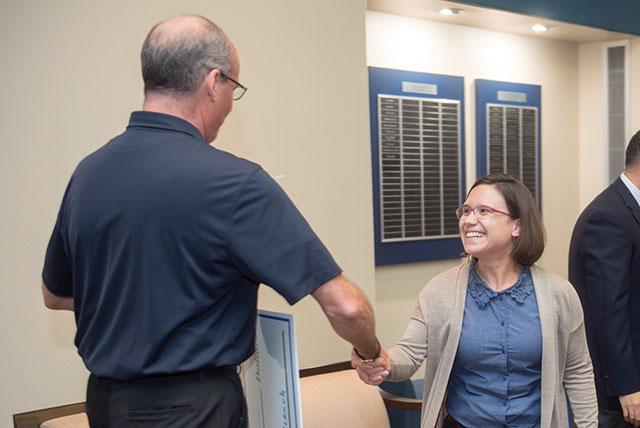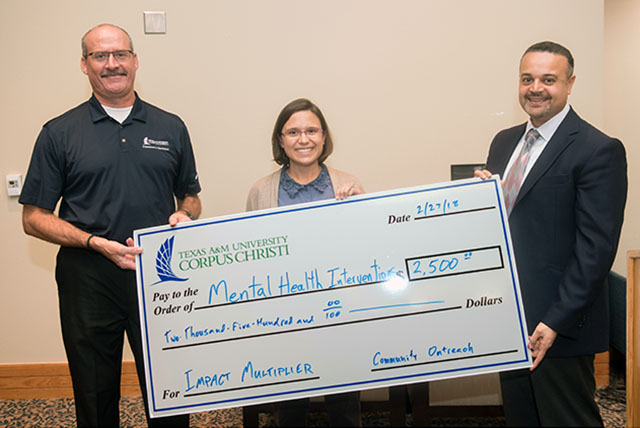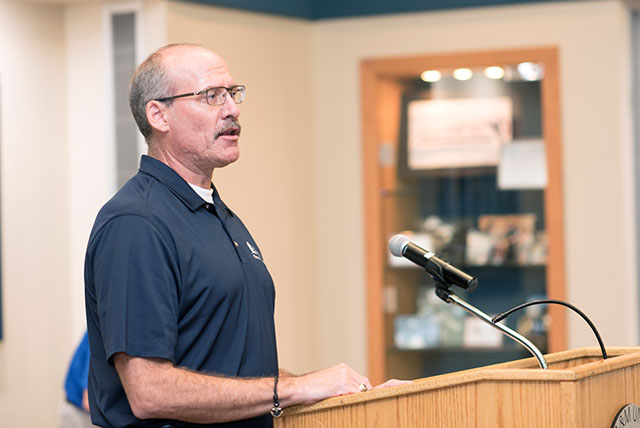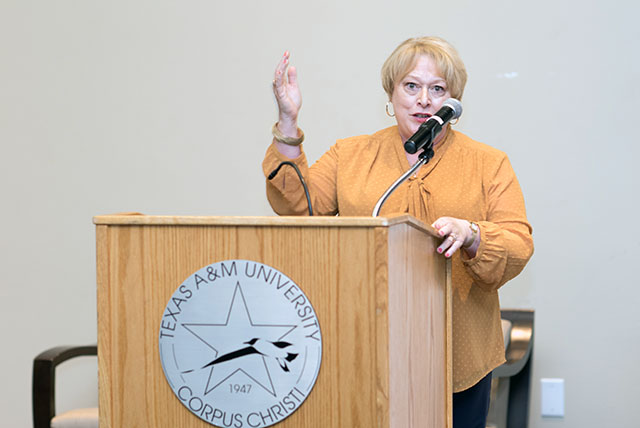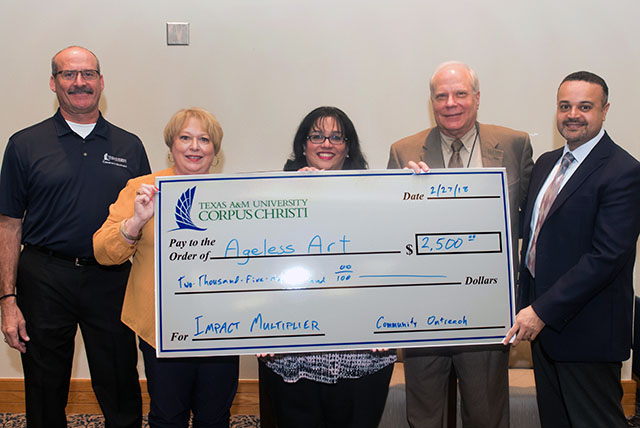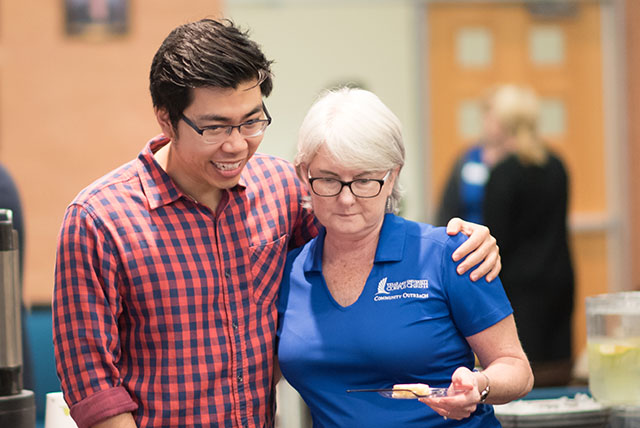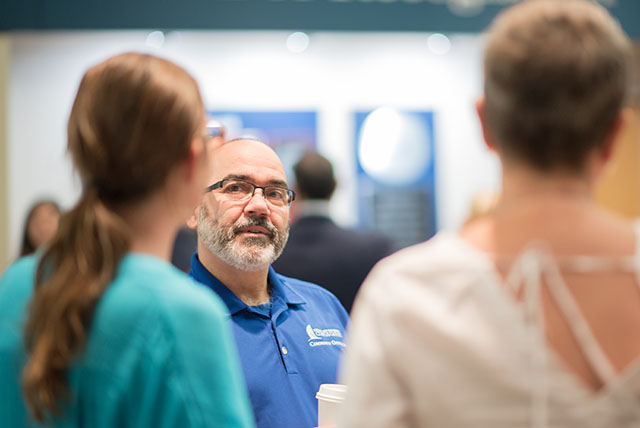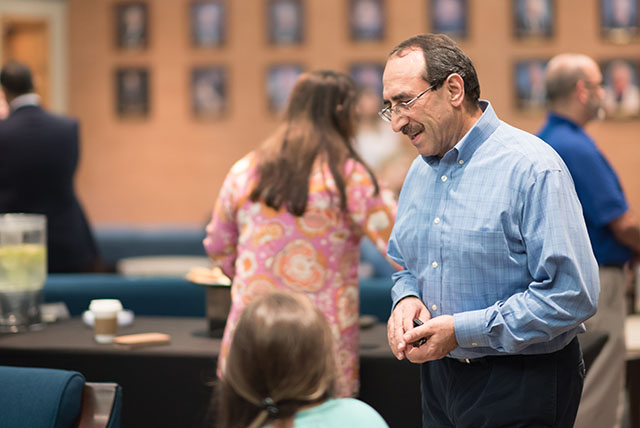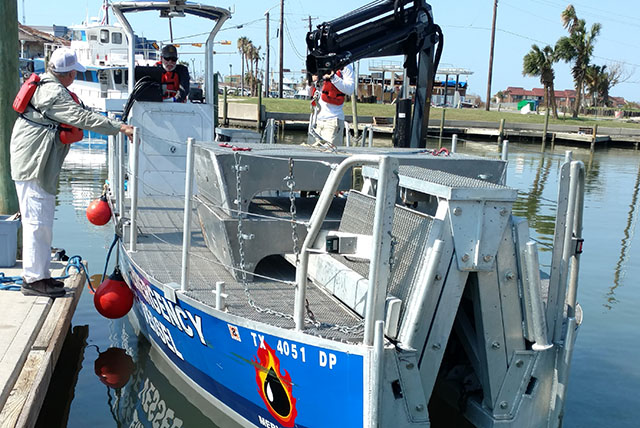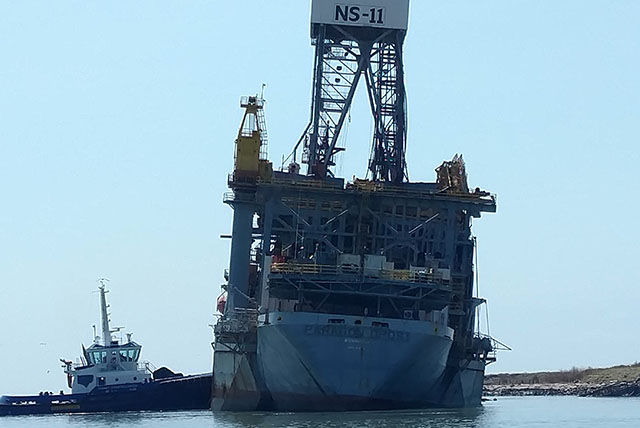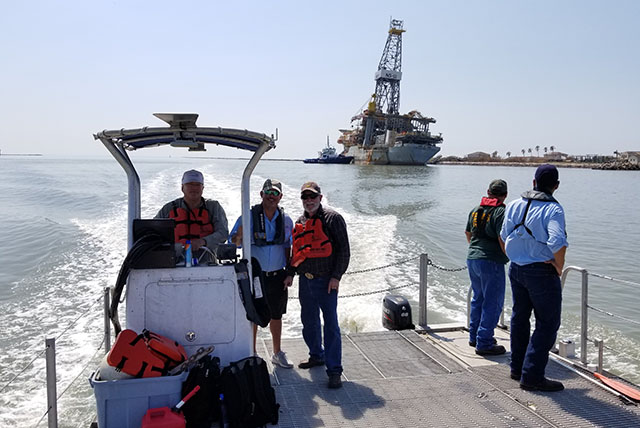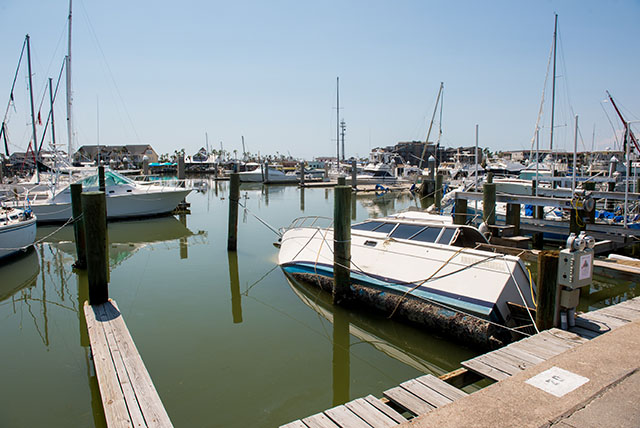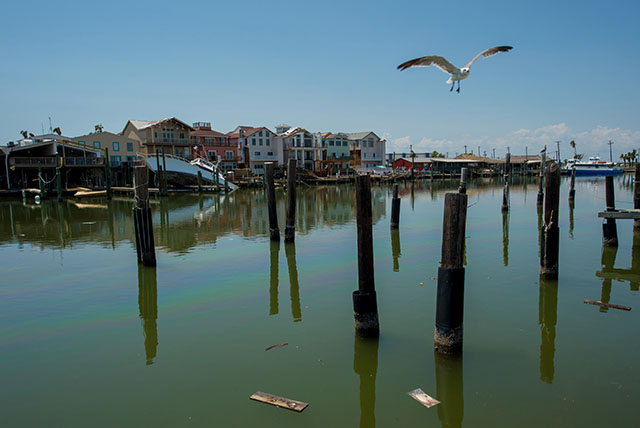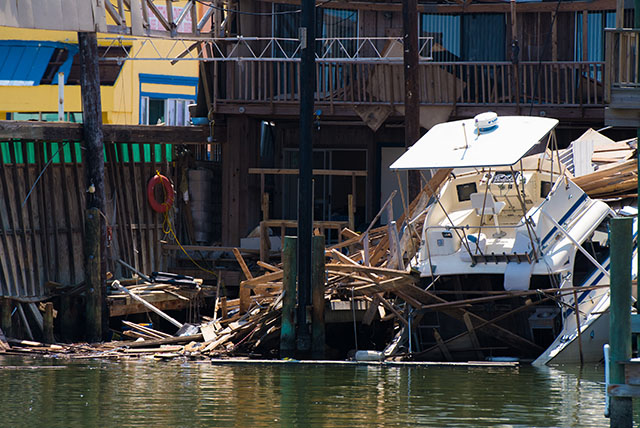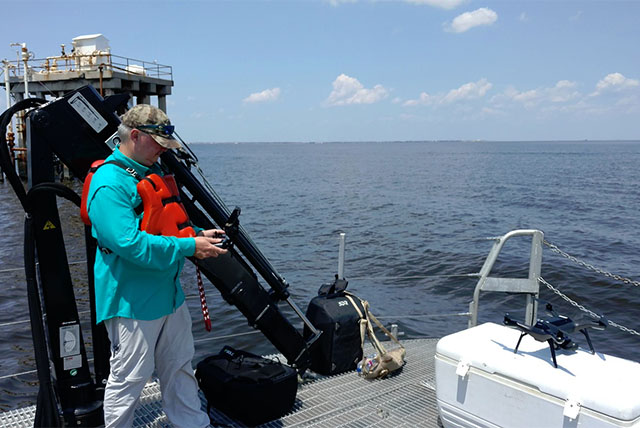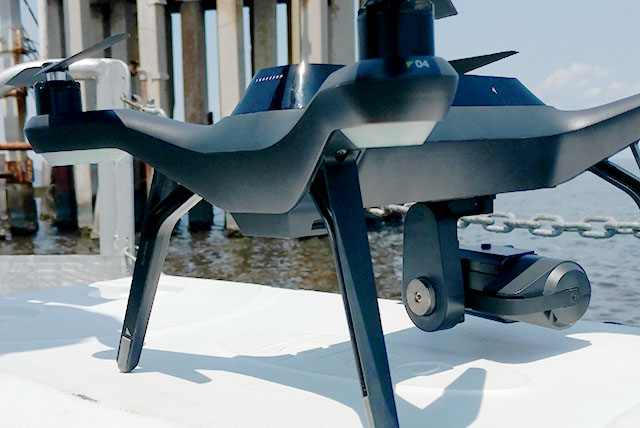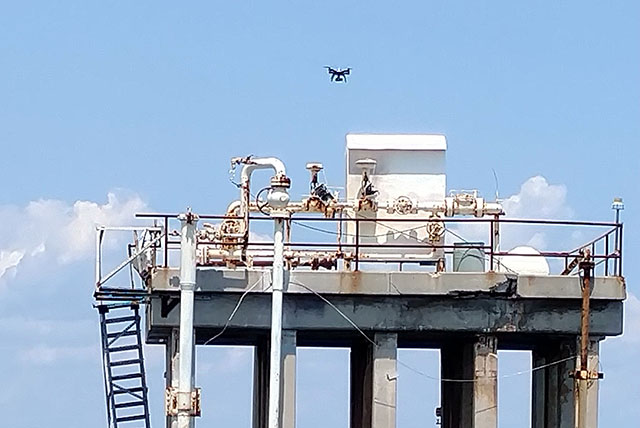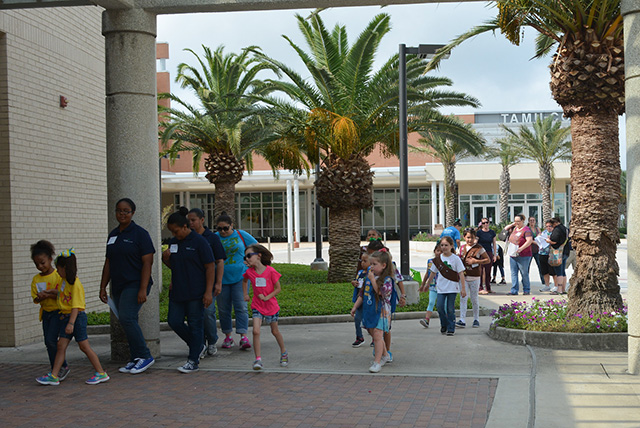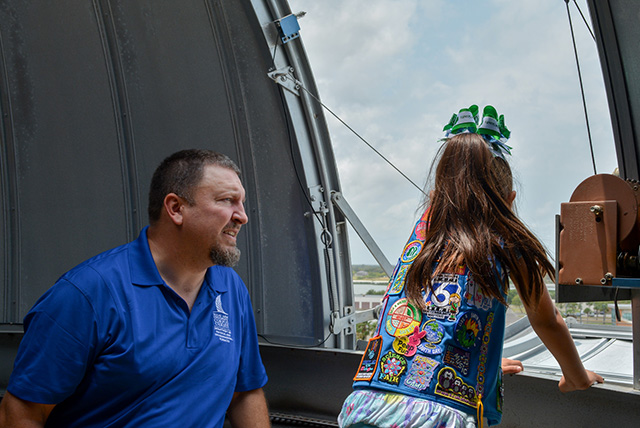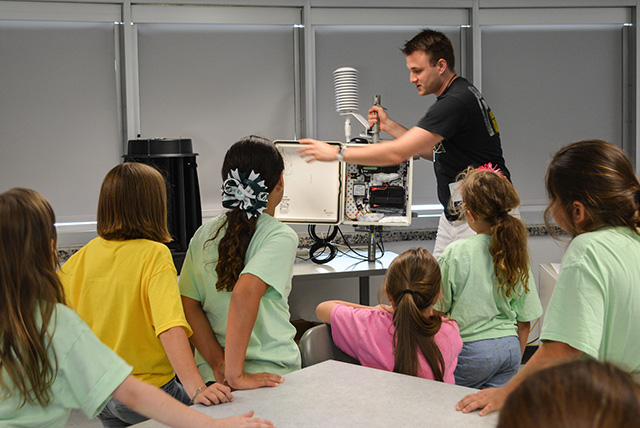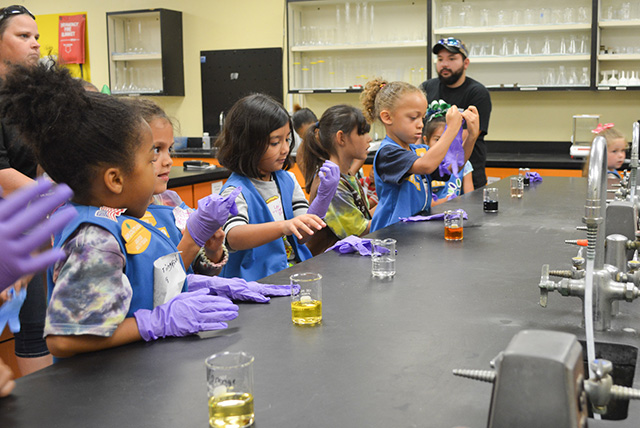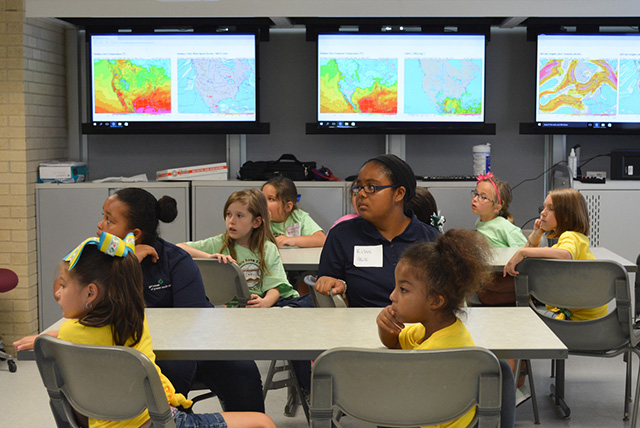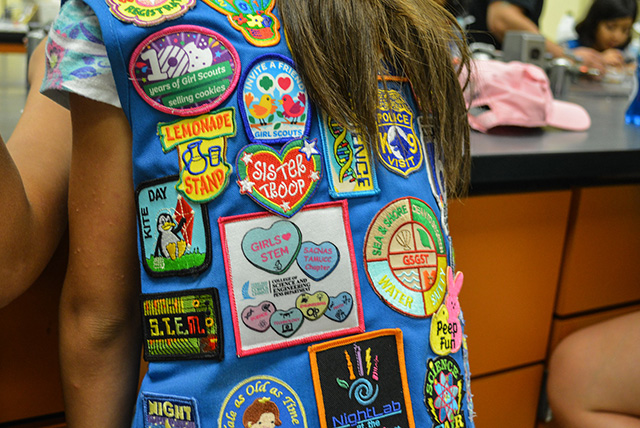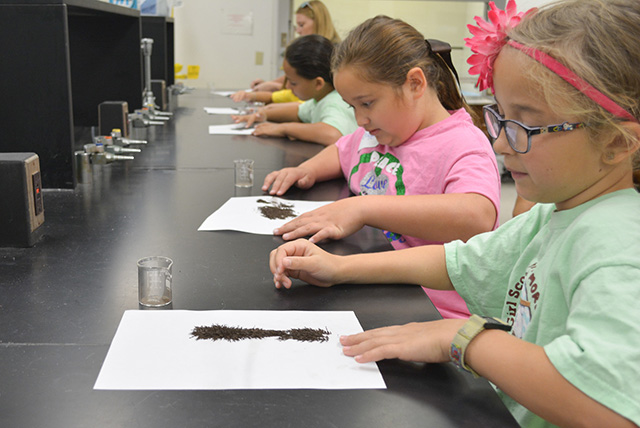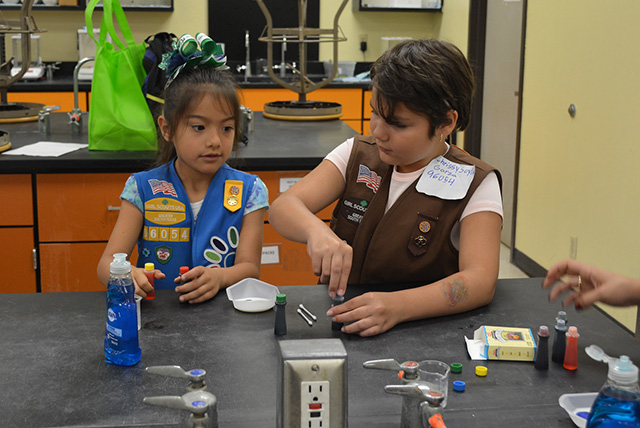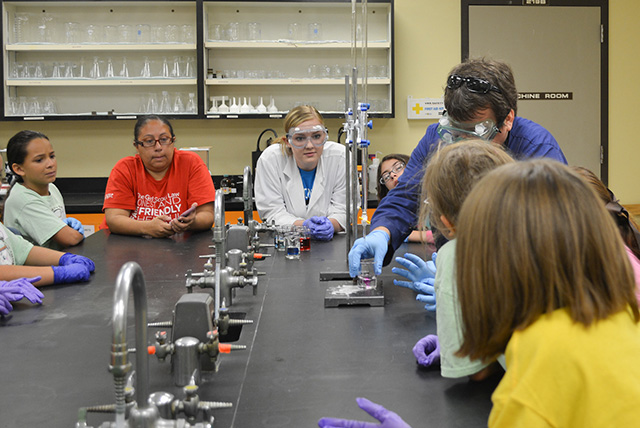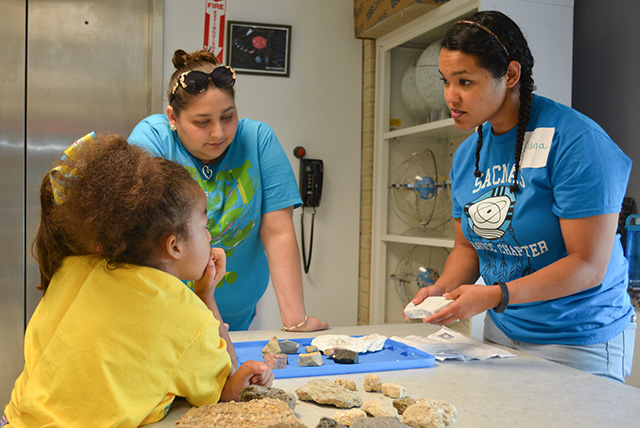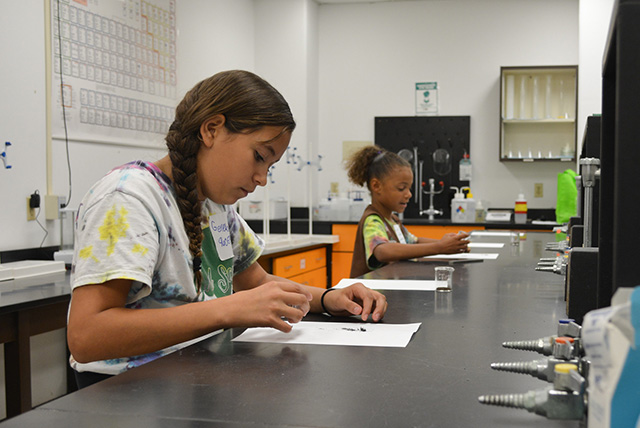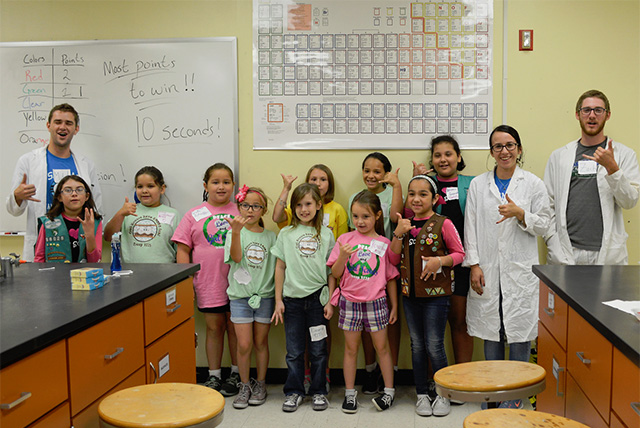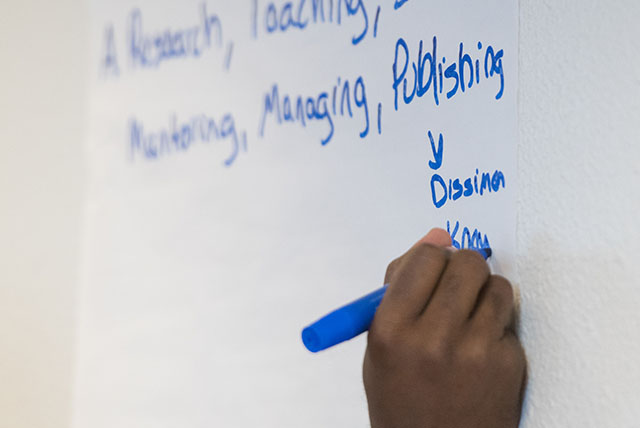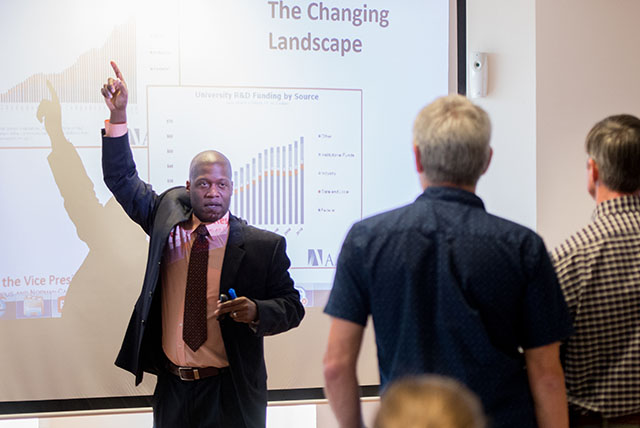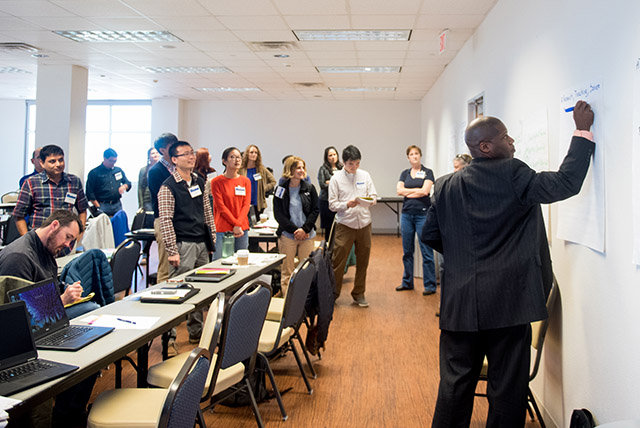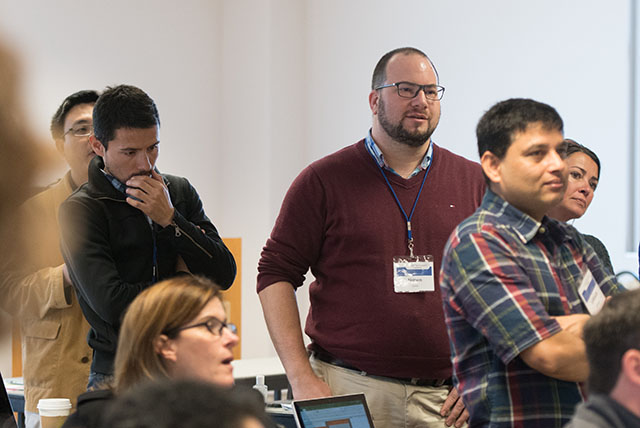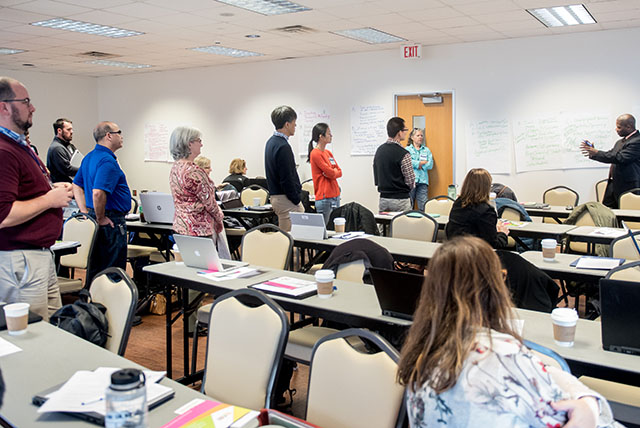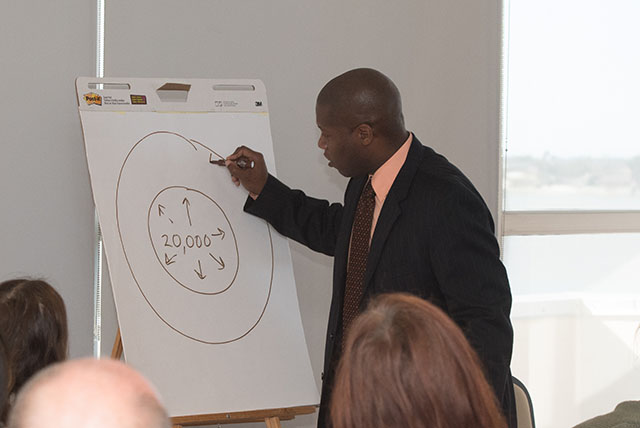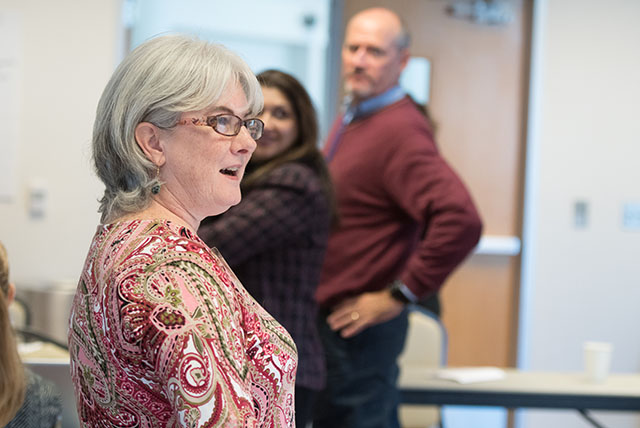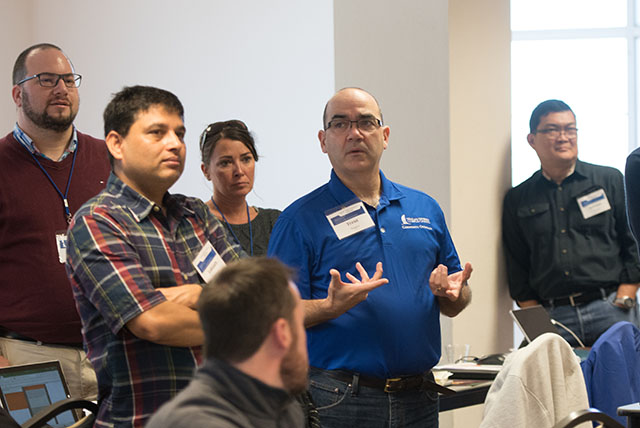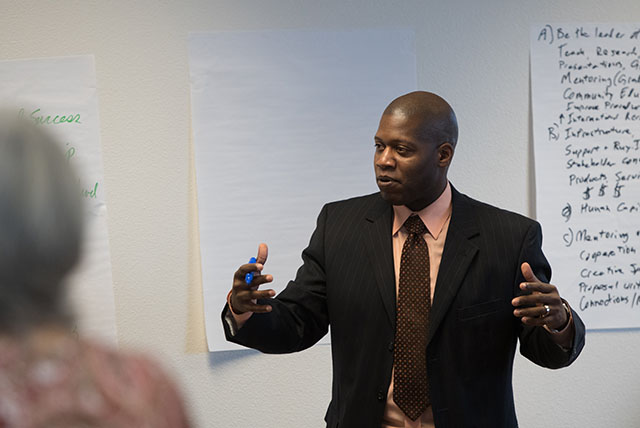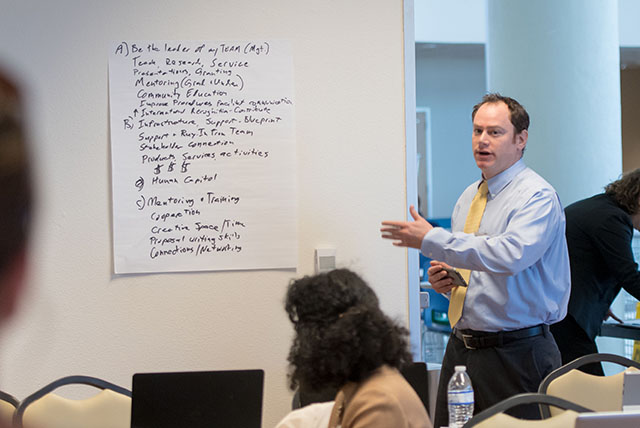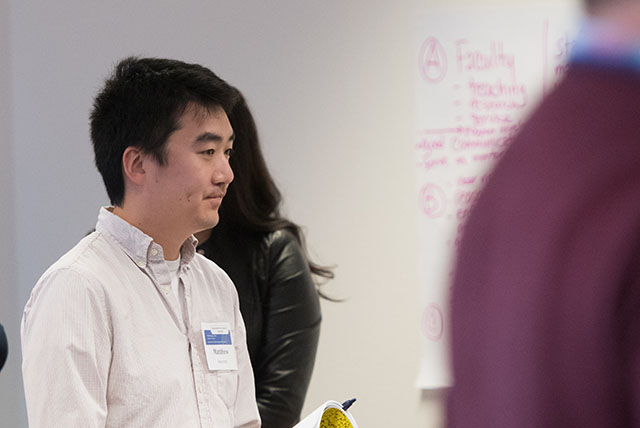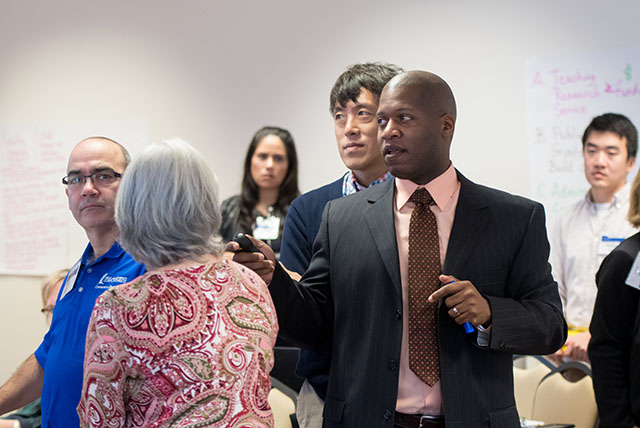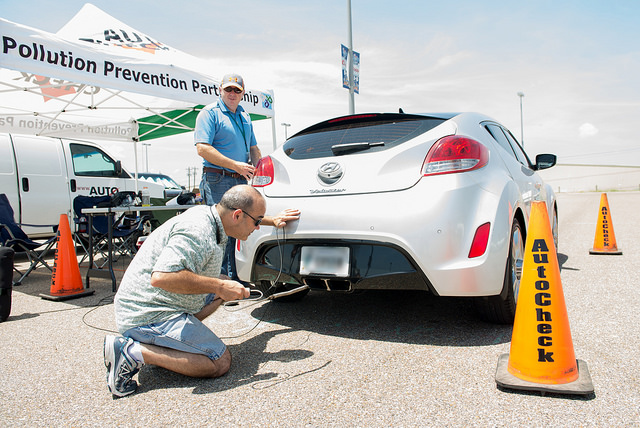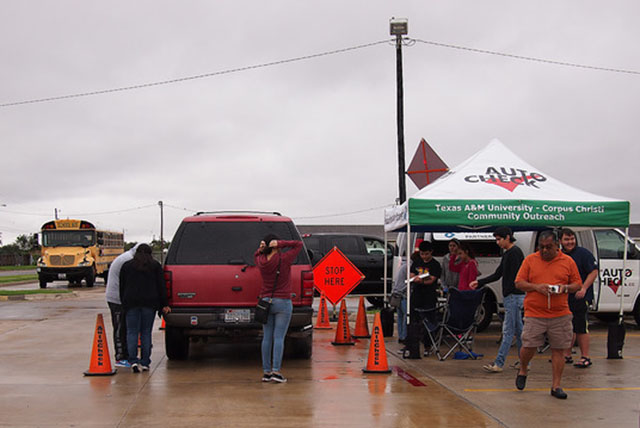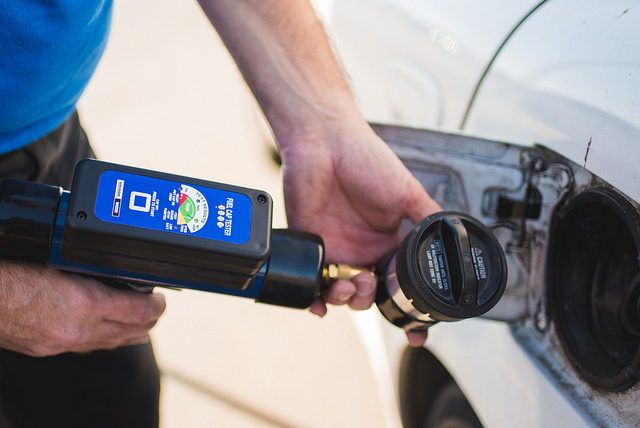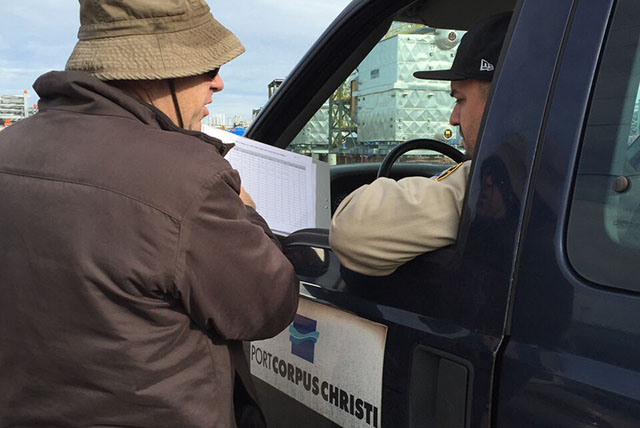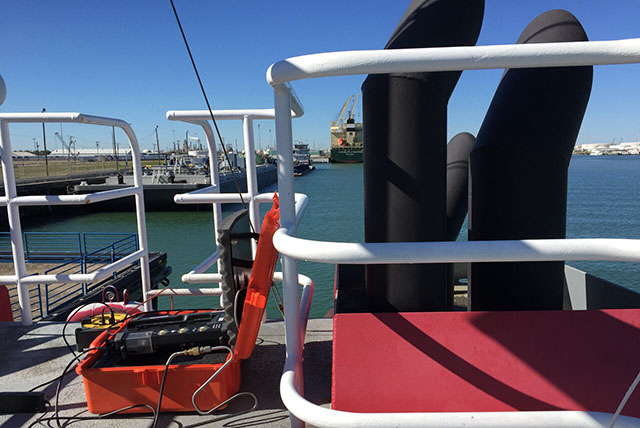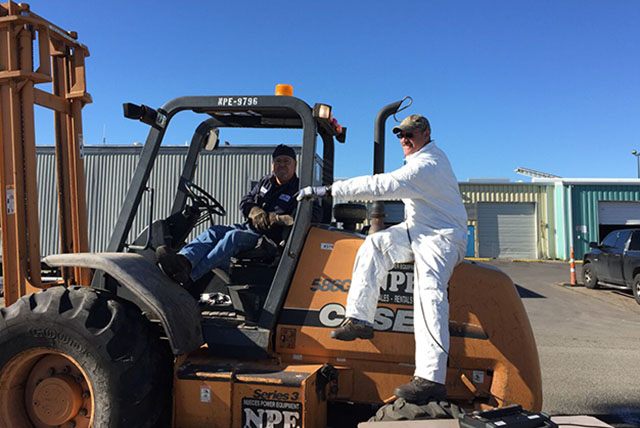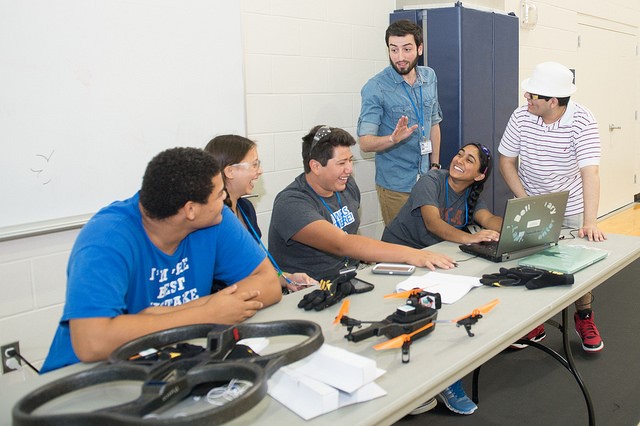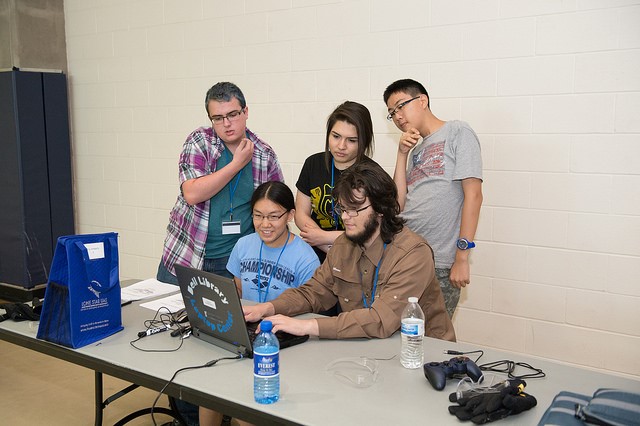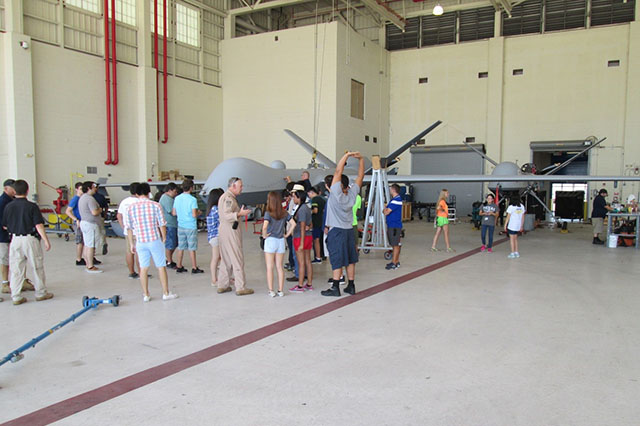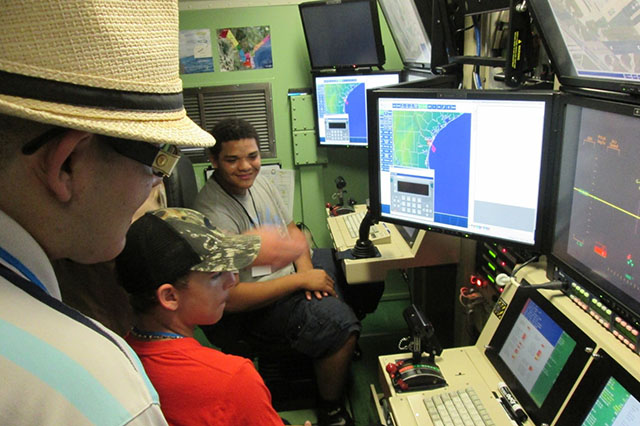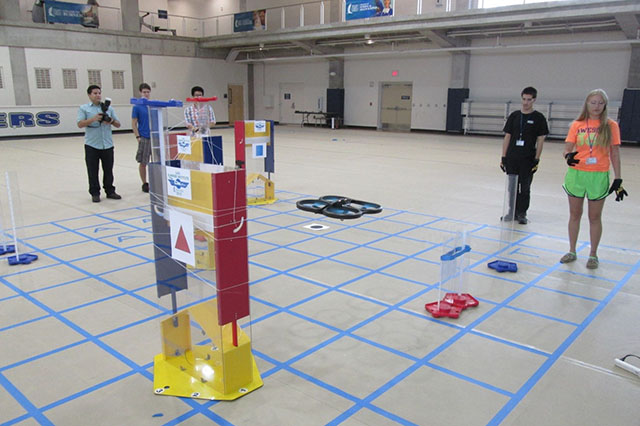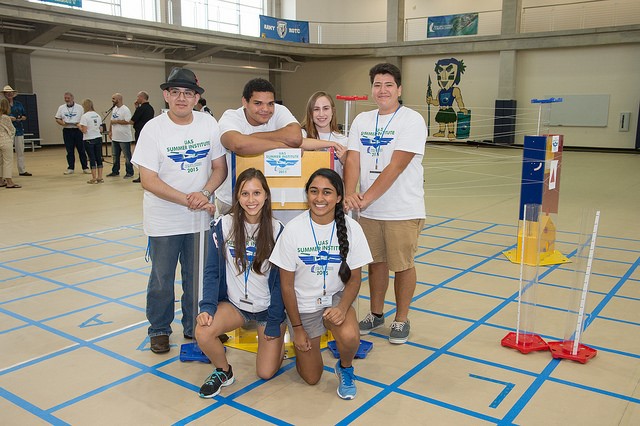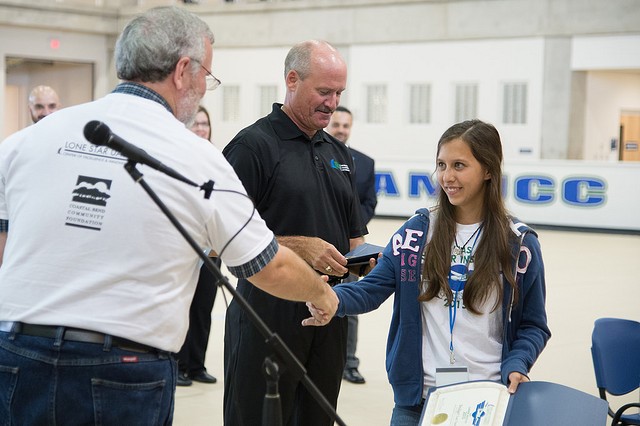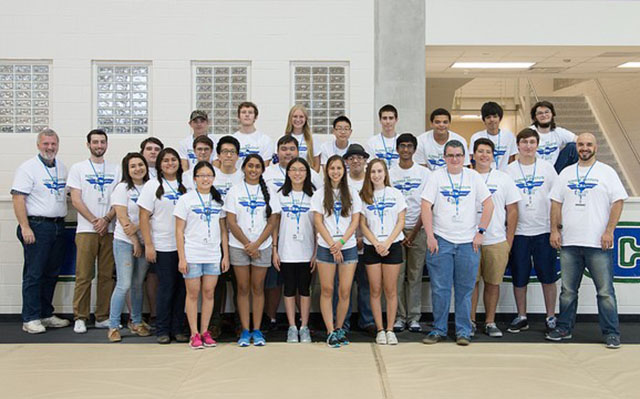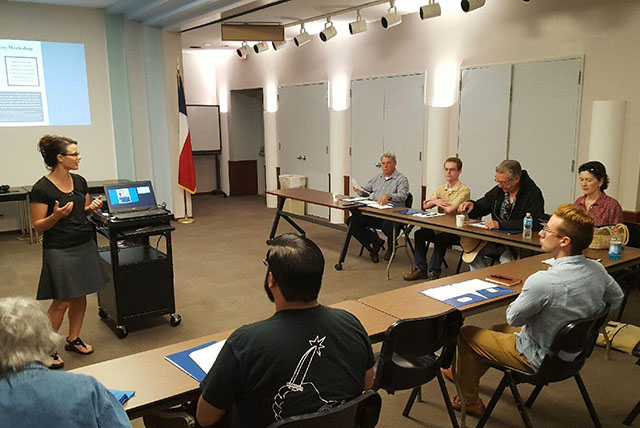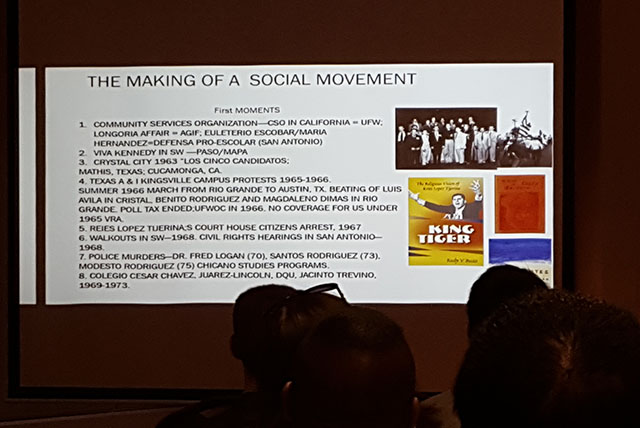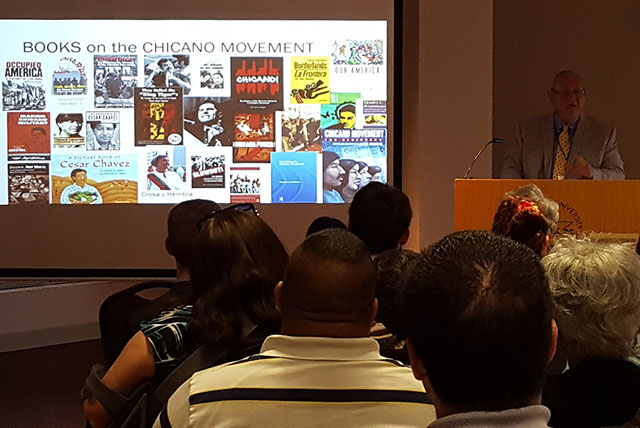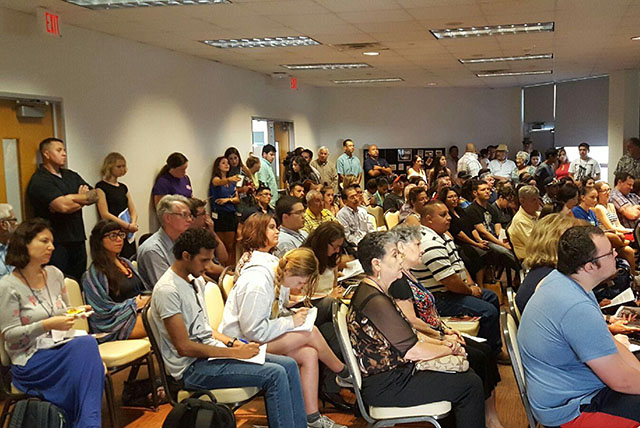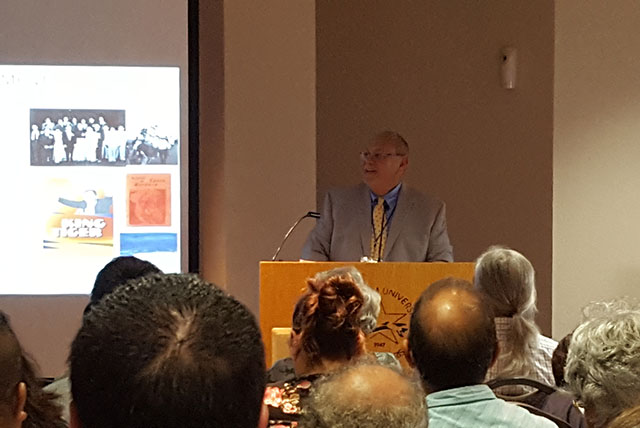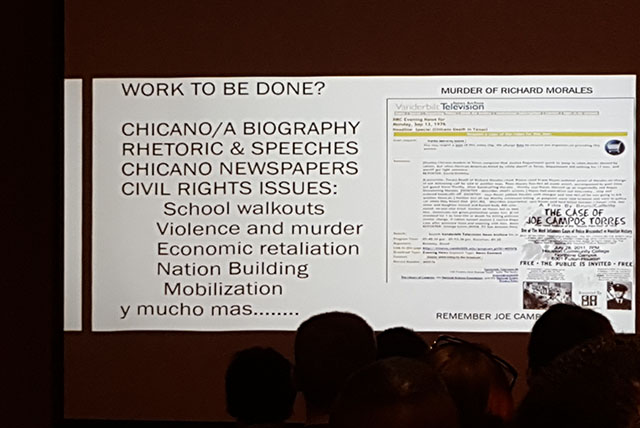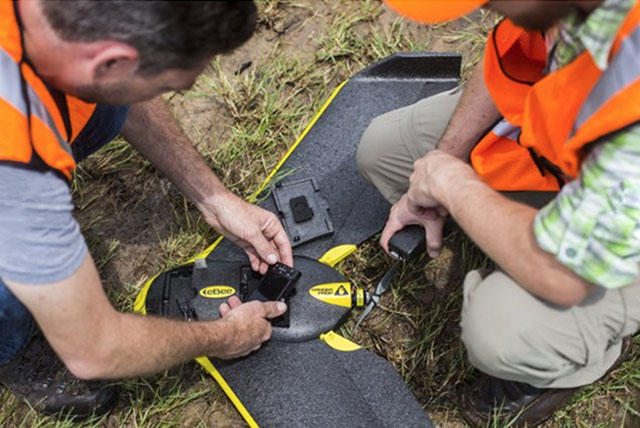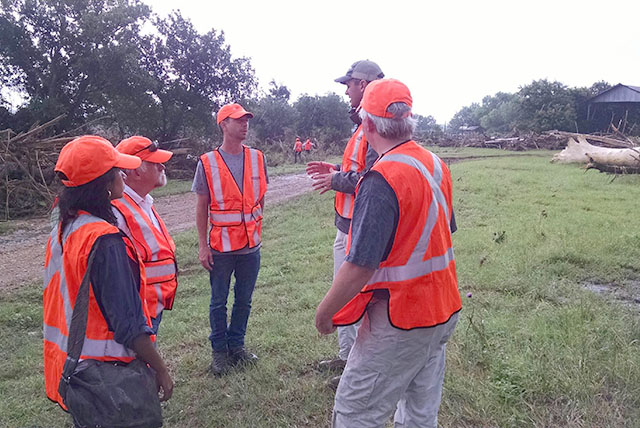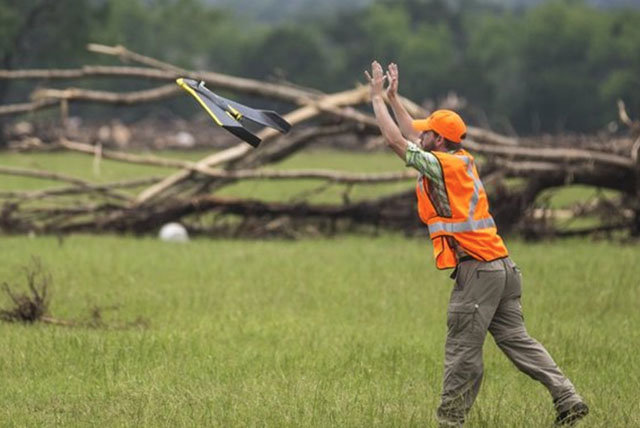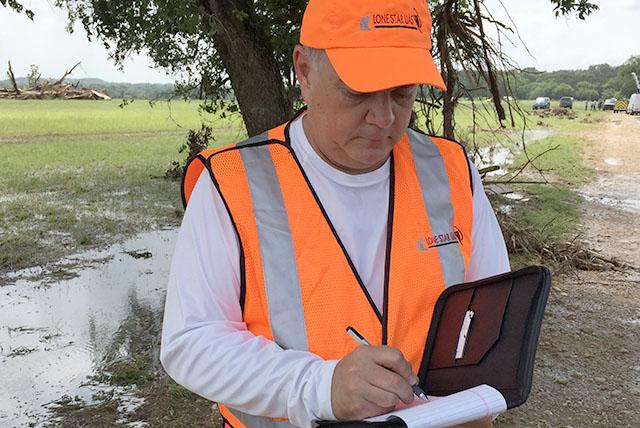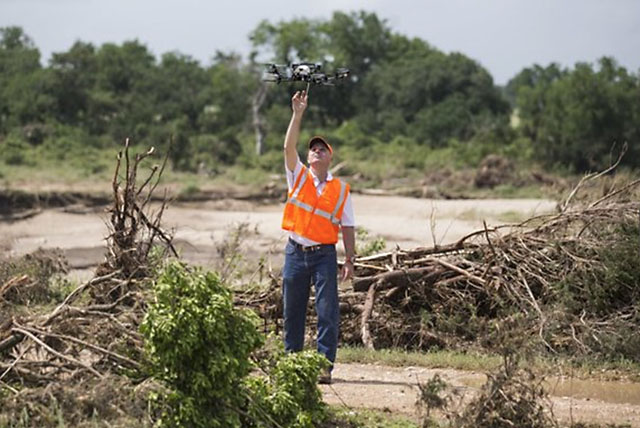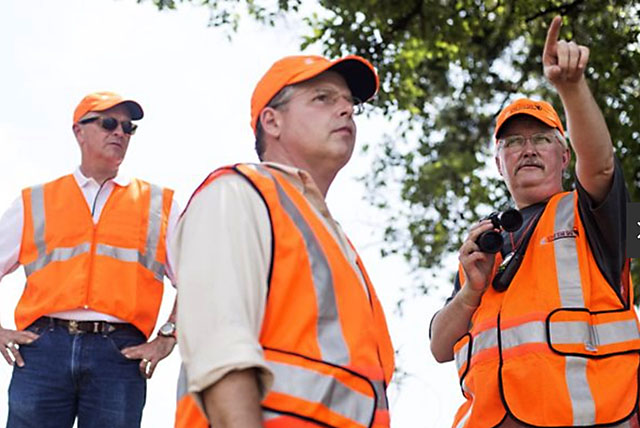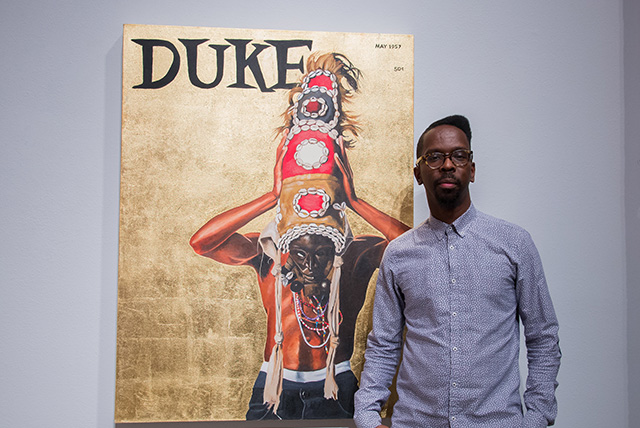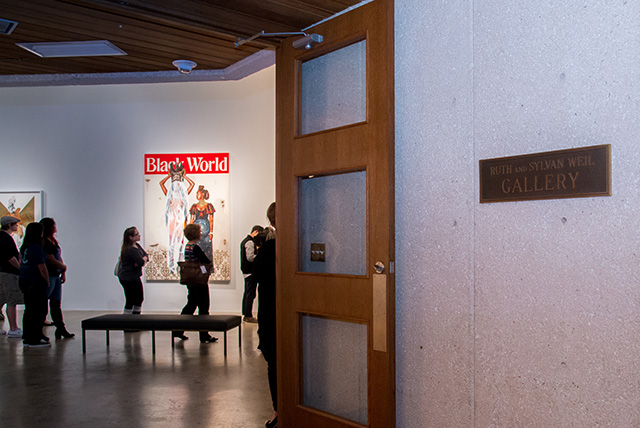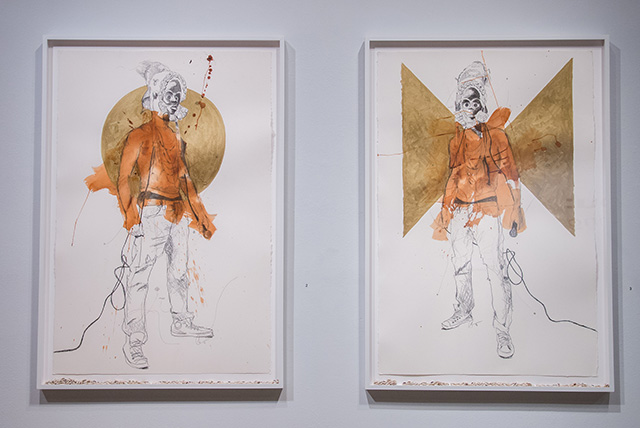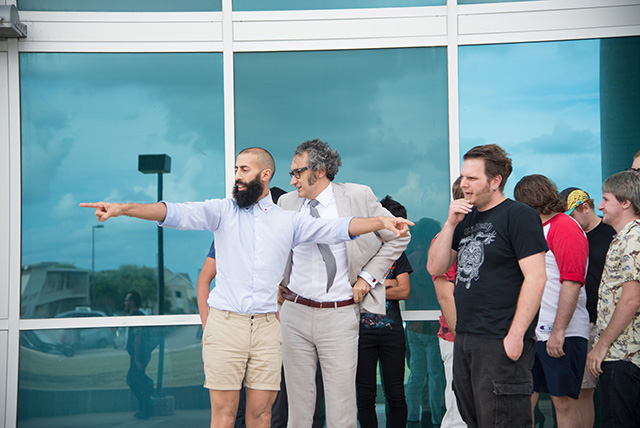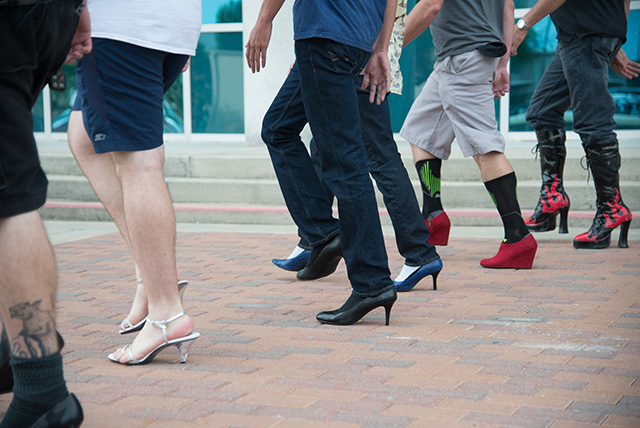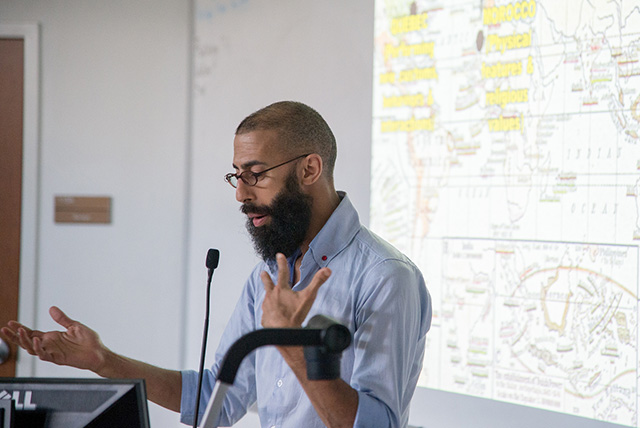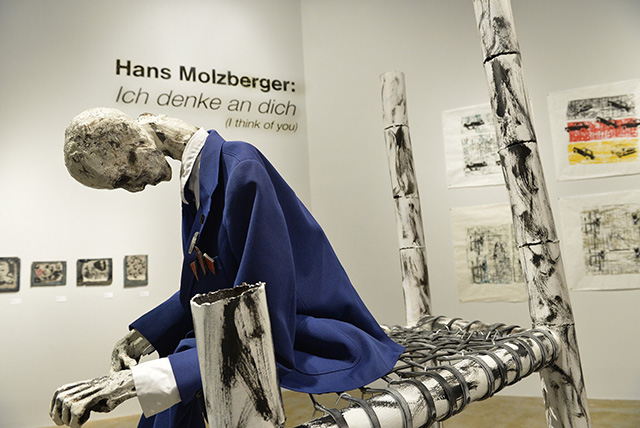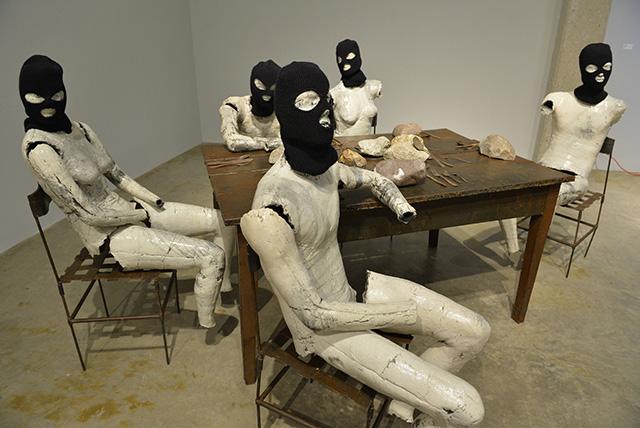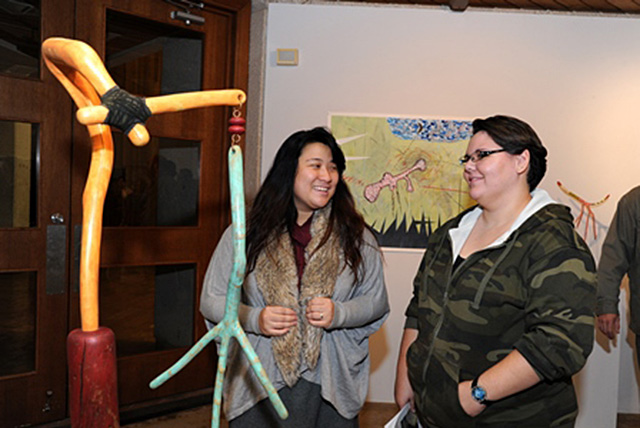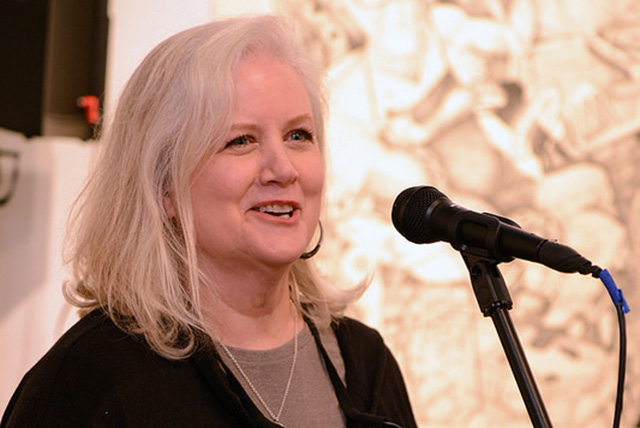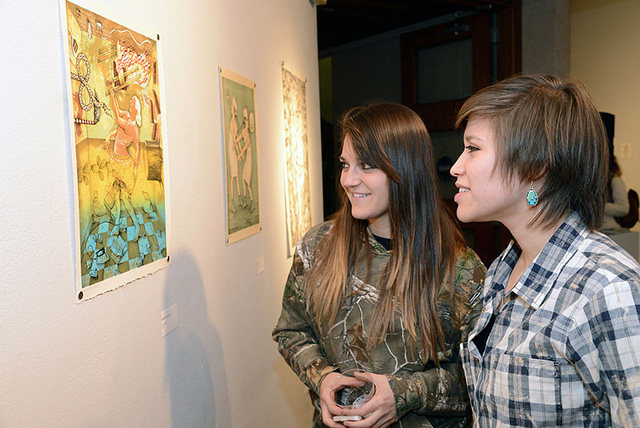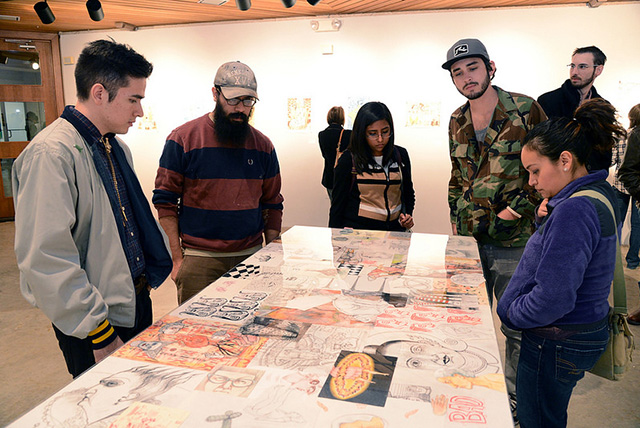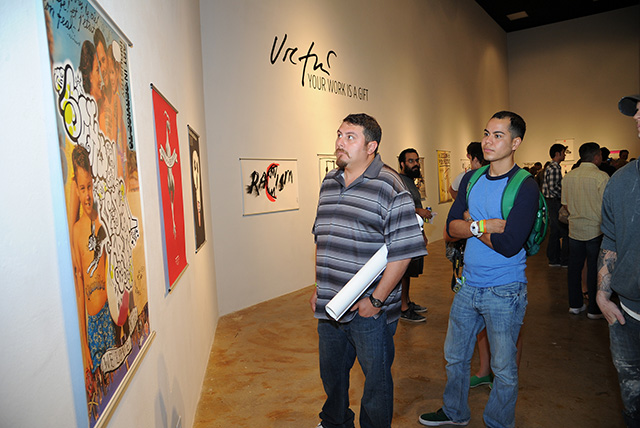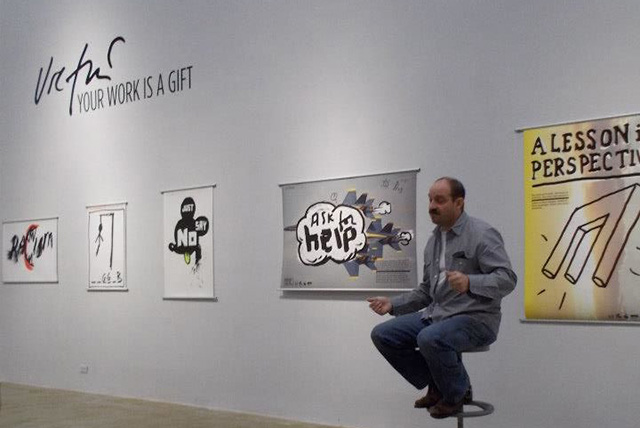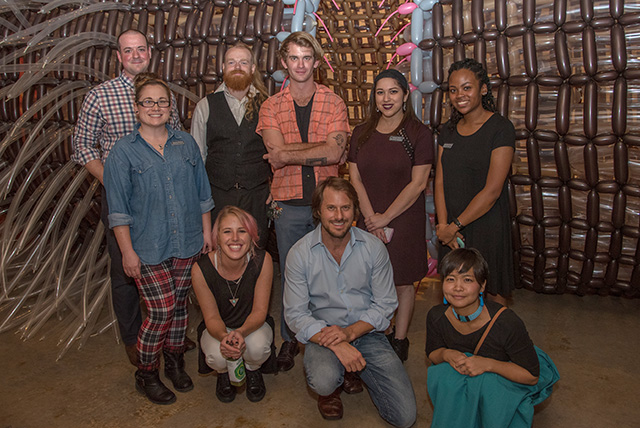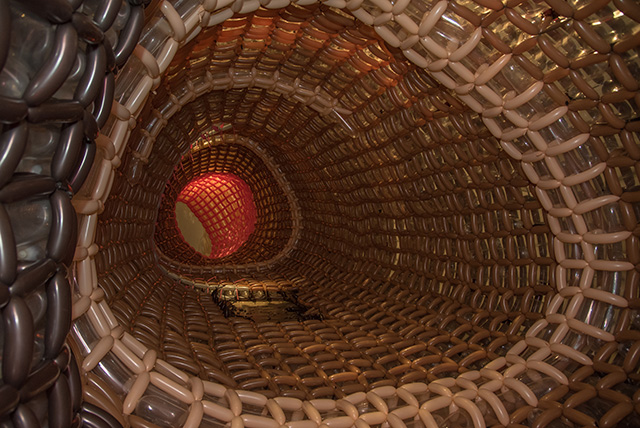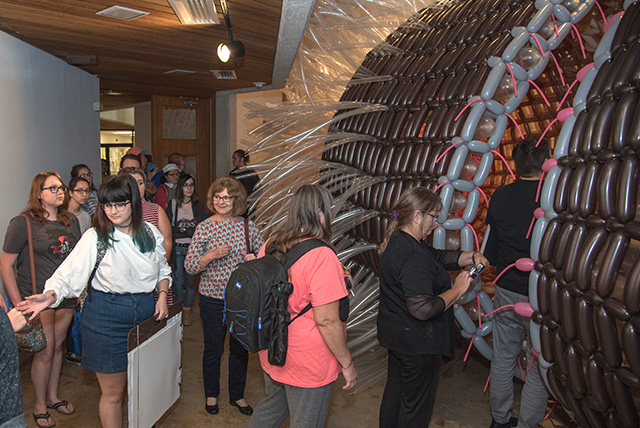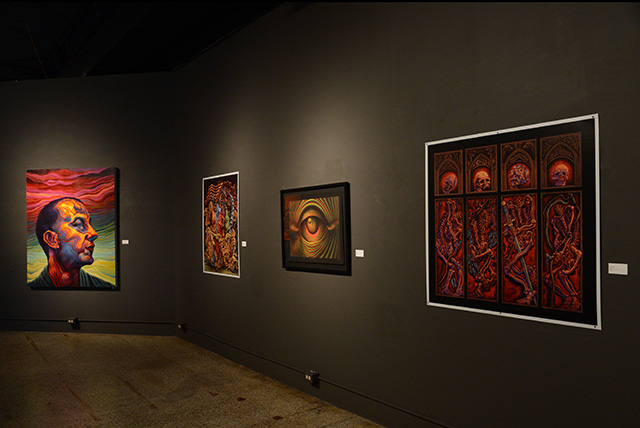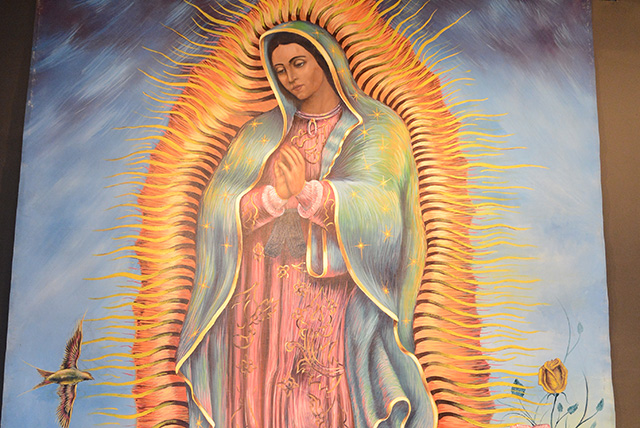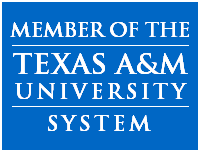Broader Impacts
Connecting the University to the Coastal Bend Community and Beyond
Broader Impacts can be defined as the potential to benefit society and contribute to the achievement of specific, desired societal outcomes. The Office of Community Outreach seeks to develop and support a community of practice within TAMU-CC that’s focused on being impactful by leaving a legacy in the community. We know that can happen through research, teaching, service and beyond and want to support and empower people to do that.
- The Office of Community Outreach is able to engage in the sponsored research life cycle beginning with the proposal development stages in order to understand and support the community engagement opportunities early in the process.
- Outreach provides informed evaluation of broader impact activity plans.
- Outreach supports broader impacts activities with logistical assistance.
- Outreach utilizes its network of community partnerships in order to maximize the local and regional impacts of research.
- Broader Impacts planning tools and resources are available on the left side of this page. Additional resources as well as individual consultations are available upon request.
- Impact Multiplier Grants are available to faculty and staff to foster and facilitate community engagement.
Explore our B.I. web stories below to learn how TAMUCC programs are helping to shape the community.
Study by TAMU-CC Researchers Suggests Ways to Improve Police Practices

Working with the Aransas Pass (Texas) Police Department, Dr. Wendi Pollock, Dr. Eric Moore, and Dr. Sarah Scott, all associate professors in the Department of Social Sciences, studied police interactions with the public.
In a paper published May 12 in the Police Journal: Theory, Practice and Principles, the research team proposed that such camera footage could be used by police leaders to implement Problem Oriented Policing (POP) to address police behavior issues. This new approach could make a big difference in today’s sometimes tense police/community relationships.
Assessments like these – known as problem analyses – would show how often force was used in any jurisdiction, as well as how often tickets were written, arrests were made and other details. In addition, it would examine whether any particular group was more or less likely to receive sanctions or actions.
“Researchers could also look at extra-legal factors such as the way officers speak to individuals of different races, genders, sexual representations or orientations, etc.,” Dr. Wendi Pollock said. “It could identify any potential legal or public relations issues. Training could be created using footage from the officers’ own departments, which is known to be more impactful. In addition, through media release, the public can have access to the research report and that increases transparency into the actions of their local police. It may also improve trust to let them know that an outside team is reviewing the police, and they are not policing themselves.” See the full story.
Rockport-Fulton Economic Development Collaboration

Researchers from the College of Business at Texas A&M University-Corpus Christi joined other experts in assessing economic development possibilities for the community of Rockport-Fulton.
Communities as Startups is a three-way partnership being spearheaded by Diane Probst, CEO of the Rockport-Fulton Chamber of Commerce, Coastal Bend Business Innovation Center (CBBIC), and the IC2 Institute at the University of Texas. The partnership, which explores economic resilience in the Coastal Bend region, is made possible in part by the Economic Development Administration of the U.S. Department of Commerce.
Participating from Texas A&M-Corpus Christi were Dr. Kent Byus, Professor and Director of Entrepreneurship Education in the College of Business, and Russell Franques, director of CBBIC which provides small businesses in the 11 counties of the Coastal Bend region with a range of business incubation, acceleration, consultation, and networking resources that enable and enhance the sustainability of a robust entrepreneurial ecosystem.
Over the three days, Byus and Franques were joined by researchers Dr. Greg Pogue, Dr. James Jarret, and Jonathan Alba from the IC2 Institute. They explored the community, conducted interviews, and hosted workshops.
The IC2 Institute was established at The University of Texas at Austin in 1977, as a think-and-do tank to explore the broad economic, technological, and human factors that drive economic development in regions. The IC2 Institute focuses on innovation and entrepreneurship in rural areas and small cities and creates programs to have a positive impact on the world.
“We are grateful for the talents and assistance from the IC2 Institute and Texas A&M-Corpus Christi’s Coastal Bend Business Innovation Center,” said Diane Probst, President/CEO of the Rockport-Fulton Chamber of Commerce. “The information gathered will be helpful as we identify our next steps in economic recovery. It doesn’t happen overnight but it is best to study, plan and set goals to get you there. We are extremely privileged to have their help and support in this process.” See the full story.
Grow Texas Oysters Summit

Legislators, scholars, restaurant owners, and state officials gathered at Texas A&M University-Corpus Christi for “Texas Oyster Aquaculture Summit – A New Industry for Texas” held July 10. The full-day summit, hosted by State Representative Todd Hunter, focused on Texas oyster aquaculture and House Bill 1300, a new law co-authored by Hunter that allows oyster mariculture in Texas, which is predicted to generate a significant economic boost to the Coastal Bend and reduce harvest pressure on wild oyster reefs.
The Island University’s Harte Research Institute for Gulf of Mexico Studies has a long history of involvement with oysters and their importance to our coastal waters, from the Sink Your Shucks program to the Oyster Resource and Recovery Center and extensive research on the mollusks. Many of Texas A&M-Corpus Christi’s own sat on summit panels, including Dr. Larry McKinney, Senior Executive Director of the HRI, who discussed how aquaculture could strengthen the sustainability of the Coastal Bend’s ecology.
Research and policy work conducted at A&M-CC and HRI have been critical to this effort. Dr. Joe Fox, Chair for Marine Resources Development at the Harte Research Institute for Gulf of Mexico Studies, has already secured funding for two oyster hatcheries and a demonstration project. Along with Dr. John Scarpa, he will develop the Texas Oyster Resource and Recovery Center, which will support reef restoration and train local workforce in oyster cage culture. With help from Dr. Fox and his colleagues at the Harte Research Institute, we hope to help usher in a new era of responsible and sustainable oyster aquaculture for the Gulf Coast.
Goals of HRI oyster research include:
- provide larvae and spat for oyster farmers for commercial aquaculture along the Texas coast
- partner with academic and research institutions, fisheries agencies, and the commercial industry to restore and develop new critical oyster reef habitat for promotion of environmental health and sustainability of estuaries
- bolster economic resilience of coastal communities and long-term stabilization of oyster stocks
- ensure responsible stewardship of Gulf Coast resources for future generations via education and outreach
Three Impact Multiplier Grants Awarded January 2019
A Pilot Program for Teacher Research Experience in Robotics, Computer Science
COping with Death through Art (CODART)
Islander L3 – Literacy, Language & Learning

Along with the ever-important goal of preparing students for life beyond the classroom, a university should engage with the surrounding community. IMG offers grant funding to Texas A&M-Corpus Christi faculty and staff who submit a winning proposal for a project that will positively impact the Coastal Bend or wider community. In this second cycle of IMG funding a record number of 35 applications were submitted. Each grant winner this cycle will offer programs to impact youth in the Coastal Bend. This year’s winners are:
A Pilot Program for Teacher Research Experience in Robotics, Computer Science, submitted by Dr. Alaa Sheta, professor of computer science; Dr. Mamta Yadav, professional assistant professor of computer science; and Dr. Rosa Banda, assistant professor of educational leadership. The team received $5,000.
Sheta and his team plan to teach robotics and computer science concepts to local teachers during the summer months. Through these new teaching methods, it is Sheta’s hope that young students will be inspired to pursue careers in STEM.
“For each of these teachers involved, we believe they will be able to spread their new-found knowledge to each student they interact with from here onwards,” said Sheta.
CO ping with Death through Art (CODART) , submitted by Dr. Jennifer Gerlach, assistant professor of counselor education; Dr. Kristina Nelson, assistant professor of counseling and education psychology; and Dr. Sandy Griffith, assistant professor of clinical mental health counseling. The team received $5,000.
Through CODART, Gerlach will provide art-based counseling to children and families struggling with the loss of a loved one.
“We need to give a safe place for children and families to grieve and mourn,” said Gerlach. “Grieving children are more likely to develop negative health outcomes, behavioral issues, or substance abuse problems, but mental health interventions like CODART can lessen these negative effects by providing a safe place to explore their grief journey.”
Islander L3 – Literacy, Language & Learning, submitted by Dr. Kelli Bippert, assistant professor of literary education. Bippert received $1,215.
The Islander L3 program will support local schools who have English as a second language learners by providing these students with tutoring, reading materials, and technology at no cost to the school.
“Our public schools often grapple with how to meet the needs to their diverse student populations,” said Bippert. “While one-on-one and small group instruction can be incredibly beneficial to students who need additional academic support, schools don’t always have the resources to make this happen. We will help fill this gap by utilizing our graduate and undergraduate students who each bring their experience, energy, and enthusiasm to our tutoring program.”
Ageless Art: Bringing Creativity to the Young at Heart

Ageless Art! is one of the first programs to receive funding through an Impact Multiplier Grant. Art transcends language, race, and age. Art brings people together and soothes our souls – especially for those who need a creative outlet. That creative outlet came in the form of “Ageless Art! Senior Outreach Program,” a free eight-week art workshop for Coastal Bend senior citizens that was hosted by the Art Museum of South Texas (AMST).
The workshops, led by Rachél Payne, AMST art instructor, allowed attendees time for self-expression and gave them a chance to build their own art community. As they worked on their projects, participants would complement each other’s designs, offer advice, and encourage others to create art even if they did’t have experience.
“I was very nervous to come because I had a stroke and often need things repeated to me,” said Elizabeth Glass, a senior who attended every single workshop but one. “But our instructor inspired me so much that I wasn’t scared anymore. This was a big hurdle for me. I’m happy to be here, everybody’s so nice, and it’s a special group.”
Classes were held in three locations to increase the accessibility of the program: Northwest Senior Center, Broadmoor Park Senior Center, and Garden Senior Center. During the workshops, participants learned basic art design elements, engaged in mixed media activities, and were encouraged to explore their creativity.
“We have touched the lives of those who don’t have the opportunity to come out to the Art Museum of South Texas because of mobility or health issues,” said Sheri Emerick, director of Development for AMST and original grant applicant.
Islander Students Address Corpus Christi Homelessness to Create Real-World Solutions

In spring 2018, the Master of Public Administration (MPA) Program Evaluation course at Texas A&M University-Corpus Christi, taught by Dr. Sarah Scott, assistant professor of criminal justice and public administration, teamed up with the Advisory Council on Homelessness, Mental Illness and Substance Abuse, also known as the Homeless Advisory Council, to provide recommendations that could improve the quality of life of homeless individuals in Corpus Christi.
Using homeless veterans as their target population, students collected data on two different initiatives to see if either would be viable in Corpus Christi. One initiative, the Homeless Workers Program, focused on proving homeless individuals with opportunities for daily employment as part of community beautification programs. The second initiative, the Tiny Homes Program, would provide low-cost housing and give homeless individuals the foundation to build relationships with their neighbors.
At a packed presentation held on campus in late spring, a representative from each team of students shared their findings and recommendations with members of the Homeless Advisory Council as well as fellow Islander students and faculty. The MPA students recommended that Corpus Christi would first need to define the word “community” and use that definition to guide development, secure land and establish a work program that provides homeless individuals a chance to improve their lives. They also noted that working with a nonprofit organization seemed to promote the best results.
“It’s been a great partnership between the University and the Homeless Advisory Council,” said Amy Rhoads Granberry, CEO of Charlie’s Place Recovery Center and representative of the Homeless Advisory Council. “Having students run the research while we work on logistics has been a fantastic experience. This is a community problem and we want to ensure the part of the community that lacks a voice is given a voice.”
With the success of this class project, Scott plans to incorporate the topic of homelessness in future courses and tailor subsequent Program Evaluation courses to tackle different initiatives at different stages for several years. With sustained effort, she hopes to have a bigger impact, not only on the community but also within her class, by providing students with hands-on learning opportunities to work towards real-world solutions.
Along with the presentation held on campus, students presented their findings to the Corpus Christi City Council, the Regional Health Awareness Board and the Nueces County Commissioners Court. See the full story here.
Two Impact Multiplier Grants Awarded February 27, 2018
Ageless Art!
Mental Health Interventions

Thanks to the generous support of the Division of Research, Commercialization
Hollenbaugh, who submitted the project titled “Outreach in Corpus Christi via Impactful Mental Health Interventions” plans to provide free counseling services to the local community through psychoeducational groups in collaboration with Dr. Yvonne Castillo, director of the Counseling and Training Clinic. During the counseling services, participants will learn to manage difficult emotions, including anger, stress, depression
“We hope that by people being able to manage their anger, not only is their personal wellness affected, but the dynamic in their home is affected,” said Hollenbaugh. “There is even research that people who can regulate their emotions are more successful in their jobs and the community, which could have a broader impact.”
Emerick plans to partner with the Corpus Christi Parks and Recreation Senior Community Services Program on the project titled, “Ageless Art! Senior Outreach Program.” This new program will seek to connect individuals ages 55 and above with hands-on art instruction. Rather than simply ‘crafting,’ classes will emphasize creativity, self-expression and basic art design elements. In partaking in the creative process, participants will have improved cognition through hands-on art practice, as well as lessened depression and anxiety and a greater sense of self-control, self-esteem
“We will be touching the lives of individuals who don’t have the opportunity to come to the Art Museum of South Texas because of mobility or health issues,” said Emerick. “So, we will be able to bring art education to them thanks to this funding!
The two winning projects were selected by a campus committee chaired by Miller and including Jaime Nodarse Barrera, Vice President of Institutional Advancement; Ann Degaish, associate vice president of Student Engagement and Success and dean of students; Kellie Smith, professional assistant professor of communication and interim coordinator for the Center for Faculty Excellence and Trent Thigpen, program manager for the Pollution Prevention Partnership in the Office of Community Outreach. Applicants were evaluated on how well the project would impact the Coastal Bend community, how much the additional funds would impact the project and the potential for the project to have a broad impact on the community. The selection committee was particularly impressed by the broad participation among applicants across campus, as well as the high quality and creativity of the proposals.
Texas A&M-Corpus Christi National Spill Control School Searches for Oil After Hurricane Harvey

A team of students and staff from the National Spill Control School (NSCS) and the Lone Star UAS Center of Excellence & Innovation (LSUASC) at Texas A&M University-Corpus Christi supported the Texas General Land Office (TGLO) during disaster recovery efforts following Hurricane Harvey.
Tony Wood, Director of the NSCS and Jerry Hendrix, Executive Director of LSUASC, deployed Island University personnel a few short hours after receiving the support request from TGLO. The team was sent to Port Aransas, which received the brunt of Harvey’s destructive force and is still without power a week after the storm. Their job was to assess marine and structural damages in the Port Aransas Harbor and Aransas Bay by surveying oil production structures, sunken vessels and floating debris left behind after Harvey.
“The destruction that occurred in Port Aransas is just gut-wrenching,” said Wood. “To see all of the boats – the life-blood of the community – stacked up on each other really makes us want to help. We want to get out there into the communities and do what we can to provide our support.”
All of this would not have been possible without the new 27-foot-long 14-foot-wide Multi-purpose Emergency Response Vessel, or MERV, which was loaned to the University from a two-time alumnus. Wayne Fellers, CEO of MERV Marine USA Inc., and Bob Putt, International Vice President of MERV Marine USA Inc. agreed to loan the vessel to the University because they believed “putting MERV into an academic surrounding was the best way to have the vessel's true capabilities realized and exercised.”
Fellers graduated with his bachelor’s in occupational training and development in 1994 and his master’s in occupational training and development in 1996. He worked with Chris Gunter, marine architect, to help make his idea of a vessel that is “dedicated to life, safety, humanitarian and environmental response” a reality.
“I am part of the first class that graduated from the University after it was renamed Texas A&M-Corpus Christi and I am very proud of that,” he shared. “The MERV is the only one of its kind and I know the University will put it to work.”
MERV allowed the team access to waters less than 1.5-feet deep and gave LSUASC a place to land their drones. Staff from LSUASC flew drones over Aransas Bay and Copano Bay to collect high definition video of oil structures as well as gather geo-located photos of sunken tanks and vessels. While no oil leaks were spotted in the areas, other than a slight oil sheen on the water in the Port Aransas Harbor, NSCS is happy to report that marina operations had already put oil booms in place to prevent leaks. In total, the group was able to locate more than 70 damaged boats.
“It’s a merging of surface and air capabilities! MERV gave us the ability to operate easily and effectively over water,” said Hendrix. “We were able to gather great videos and photos while broadening our research and disaster response efforts.”
The National Spill Control School was established in 1977 and provides consulting, training and research resources to the National Response Team.
Girl Scout STEM

Increasing the visibility of minority scientists at the local and national level, the Society for Advancement of Chicanos and Native Americans in Science (SACNAS) Chapter at Texas A&M University-Corpus Christi, is hoping to encourage local youths to grasp the mysteries of science, one child at a time. The Texas A&M-Corpus Christi Chapter of SACNAS partnered with more than eight local Girl Scout troops to generate a collaborative opportunity promoting diversity and equality in the fields of Science, Technology, Engineering and Math (STEM) at the first-ever Girl Scout STEM day. The event held on May 20 at the Center for Science and Engineering on the Island University Campus.
“This event helps young minds overcome stereotypes about science and scientists in regards to gender, ethnicity and heritage, as well as the idea that science is hard or boring,” said Diana Del Angel, a doctoral student in the Coastal and Marine System Science Program and a member of the A&M-Corpus Christi Chapter of SACNAS. “Part of why we do outreach is that somewhere along the way people took their time to inspire us to pursue higher education and science and the least we can do is pay it forward. Today we may have inspired a future scientist or Islander.”
The event was organized as a united effort between undergraduate students, doctoral students and staff specializing in multiple disciplines across campus. Volunteers worked together to conduct five demonstrations while hosting campus tours around the Island University. More than 45 Girl Scouts participated in a number of activities in physics, chemistry, ecology, among other themes. In one activity, scouts were given the challenge to see who could collect the most gummy bears in the shortest amount of time representing what it is like to have to forage for food and survive in the wild. After the activity, scouts were encouraged to talk about what traits they have that contributed to a competitive advantage. For example, scouts who possessed traits like small hands or quickness helped them to understand what advantage may lead to getting the most candy in the competition.
“We wanted activities that were fun, safe and appropriate for the age group,” said Del Angel. “As scientists, we love to share our knowledge and excitement with others. When others get excited too, that just makes our day.”
Alongside SACNAS, Girl Scouts of America focuses on implementing and developing solutions for “what works” for girls who show an interest in the STEM field. The collaborative work between local Girl Scout troops and the Island University’s Chapter of SACNAS combats this hurdle and allows young women of all races and backgrounds to be exposed to a diverse sense of community and education in and out of the Island University’s labs.
Flourishing as an Educator and Researcher

The Office of Community Outreach at Texas A&M University-Corpus Christi held its first Broader Impacts Workshop on Feb. 15, 2017 in the University Center, Bayview Room. Dr. Michael Thompson, Director of Broader Impacts in Research at the University of Oklahoma, presented on the “Broader Impacts Identity: Crystallizing, specifying and implementing who you are with what you do at the university.”
“I love helping to empower people. That’s my gift,” said Thompson, as he invited faculty, staff and graduate students to be mindful of what unique talents they bring to the table beyond teaching and organizing research projects. He addressed a range of issues that often prevent professors from flourishing in their current positions as well as those things that can lead to burnout.
A core theme of the event was the development of a unique identity or professional voice in the academic community, something Thompson noted as a frequent obstacle to attracting donors or achieving tenure.
“Identity is stepping beyond one’s own role as a professor or researcher and recognizing his or her contributions to society as a whole,” said Thompson. “This entails moving from identity to relationships, and then towards partnerships within the community, which attracts donors and genuine interest in your research and outreach efforts.”
Joe Miller, Director of Community Outreach for Texas A&M-Corpus Christi, noted that Broader Impacts has traditionally been associated with research sanctioned by the National Science Foundation. However, his team would like to see the concept expanded to include all disciplines and fields.
“Hosting this ‘Broader Impacts Identity Workshop’ is one of the ways that the Office of Community Outreach is trying to develop and support a community of practice within TAMU-CC that’s focused on being impactful by leaving a legacy in the community,” said Miller. “We know that can happen through research, teaching, service and beyond and we want to support and empower people to do that.”
Thompson also noted that post-doctoral students and professors need to counter-balance their time between personal and professional areas, particularly when trying to teach courses, lead research teams and write articles, often while raising a family.
“Learning to dedicate time and energy to one thing at a time, while strategically taking time off from other ventures, is the key to successfully reaching personal and professional goals while building a legacy,” said Thompson.
Thompson ended his presentation by addressing a world-wide shift towards recognizing academic research, scholarly writing and the sharing of ideas as not only multi-disciplinary, but also focused on how these areas impact society at large.
“Wherever you go in the entire world, they will be talking about Broader Impacts,” Thompson added. “Because being able to fully actualize your goals as an educator and researcher depends on building trust with everyone including graduate students, fellow faculty members, and potential donors.”
Other Broader Impacts events sponsored by the Office of Community Outreach included a series of meetings on the Island University between Thompson and center directors, department chairs, post-doctoral research associates, and the staff of the University’s Research, Commercialization, and Outreach Division.
Pollution Prevention Partnership
The Pollution Prevention Partnership (P3) and AutoCheck programs have a primary goal to reduce ozone which causes air pollution in the Corpus Christi urban airshed. Ozone levels have been on a steady downward trend since the activities were implemented in 1995. P3 and AutoCheck attribute the reductions to successful research, applied fieldwork, partnerships and education.
Many approaches to broader impacts have been used. One significant impact is the extensive use of partnerships. P3 and AutoCheck work closely with the City of Corpus Christi, Texas A&M University Kingsville, the Corpus Christi Air Quality Group, Port Corpus Christi, the Regional Transit Authority, VISD, private industry and many other businesses and organizations. All efforts serve to improve the health, economy and education of the local community.
P3 programs are based on scientific quantifiable research methods and application. College and high school students participate in training, demonstrations and field work, including instrument operations and data collecting. Curricula, activities, training and presentations given to grade school students and teachers enhance STEM education and promote behavioral change toward the primary goal of reducing toxic emissions.
The public participants who have their vehicles screened receive an extremely practical science lesson on mechanical systems, combustion, ecology, economy and health. This information is also spread throughout the community in more formal health fair settings, media coverage and organizational presentations.
At a global level, P3 has given presentations and field demonstrations on ozone reduction strategies to four European and Asian delegations hosted by the U.S. Department of State. Achieving primary health and environmental stewardship goals is satisfying, yet being aware of and building broader impacts into our programs recognizes and puts in motion a synergy that can have profound benefits for people, communities, nations and humanity as a whole. P3 invites researchers, scholars, community stakeholders and all others with an investment in air quality issues to engage with us. Learn more about P3 and AutoCheck .
UAS Summer Institute
Considering the rapid evolution of unmanned aerial systems (UAS) technology and the significant potential of UAS to positively impact the global economy and create jobs, TAMUCC delivers the Unmanned Aerial Systems Summer Institute (UASSI) each year. The UASSI curriculum is based on participants assembling a UAS, and then using software programming tools to control and interact with it.
Participants work with TAMUCC student mentors and faculty leaders. The week long program also includes field trips to the Customs and Border Patrol Predator Operations Command Center, and culminates with a team competition of flying, programming and navigating. The program targets low-income, at-risk or underrepresented high school sophomores, juniors and seniors.
Community partners including the Coastal Bend Community Foundation enable TAMUCC to deliver this program to participants at no cost. The Unmanned Aerial Systems Summer Institute has profound impacts on the youth who participate, and is helping to empower the next generation of UAS researchers, scholars and practitioners.
South Texas Stories
South Texas Stories is a multiyear oral history initiative at Texas A&M University-Corpus Christi designed to capture the historical memory of the region through the voices of its residents. Led by history faculty, Drs. Claudia Rueda, Jen Brown, Anthony Quiroz, and David Blanke, the project focuses on collecting oral histories and sharing them with the public via special workshops, symposiums, and other programming.
In 2016-2017, Drs. Brown and Rueda led an oral history workshop at Corpus Christi’s La Retama Central Library. The event was designed to encourage the study and preservation of South Texas history. Attendees learned the best practices of conducting and preserving oral history interviews. The second event, a symposium called Chicano Voices: Stories from the South Texas Civil Rights Movement, brought together ten activists involved in the Chicano Movement in the 1960s and 1970s as well as a noted scholar of Chicana feminism. Panelists discussed the movement’s struggle for political representation, equal education, and better labor conditions.
South Texas Stories plans to continue recording and preserving oral histories in the future, holding similar workshops and symposiums, and creating a special radio series that will feature segments of the interviews as well as a website where the public can freely access the full oral histories and a downloadable podcast of the radio series.
Lone Star UAS Supports Emergency Responders
The Lone Star UAS Center of Excellence and Innovation (LSUASC) at Texas A&M University- Corpus Christi (TAMU-CC) supports local and state emergency responders with unmanned aircraft systems (UAS) and expertise. By partnering with state and local governments and agencies, the Lone Star UAS Center enables routine UAS operations, as well as response to natural disasters and other emergencies.
As an FAA-designated UAS Test Site and Texas A&M University Engineering Experiment Station (TEES) research center, the Lone Star UAS Center has the right tools and knowledge to assist first responders with search and rescue and disaster recovery. Unmanned aircraft systems are able to reach areas that may be inaccessible due to debris or high water and provide an efficient way to survey a large area more quickly.
In May of 2015, the Lone Star UAS Center sent a team of operators and UAS after historic flooding of the Blanco River near Wimberley, Texas. The Lone Star team conducted operations as part of Texas Task Force 1 in partnership with Dr. Robin Murphy from Texas A&M University’s Center for Robot-Assisted Search and Rescue (CRASAR) and others. Subsequently, the Lone Star UAS Center, with Dr. Murphy, supported flood response in Louisiana in the summer of 2016.
By partnering with local and state entities, LSUASC is able to provide appropriate support within existing response structures, while researching effective UAS methods to determine best practices.
University Galleries
The University Galleries at Texas A&M University-Corpus Christi are an important and integral feature of the educational and cultural profile of the institution. Composed of two separate exhibition venues, the University Galleries provide both the campus and broader civic communities unparalleled opportunities for engagement with contemporary artistic practices, interaction with professional practicing artists through its Visiting Artists Program, pedagogical development, and intellectual growth. Both the Weil Gallery and Islander Art Gallery are traditional gallery spaces used for the exhibition of work by TAMU-CC graduate and undergraduate students, faculty, and visiting artists from the local, national, and international contexts. Exhibitions held at these venues serve the immediate TAMU-CC campus as well as the greater Corpus Christi community and beyond.
The programs and services provided by the University Galleries at Texas A&M University-Corpus Christi have established a robust roster of engaging and educational cultural opportunities for its students, faculty, staff, and community members from near and far. Their programs bring a wide variety of contemporary art exhibitions, guest lectures, workshops, studio visits, and opportunities for collaboration to the Weil Gallery and Islander Art Gallery, as well as to local venues in the community. These programs have not only attracted artists and visitors from local, state, national, and international audiences, they have helped in recruiting efforts for student enrollment at TAMU-CC and contributed to a rapidly growing urban population in the city.
For students, the University Galleries form a bridge between the pedagogical initiatives of the classroom, centered in traditional and innovative creative processes, and the professional realm, where students gain valuable career experience. The galleries’ programming and events are dedicated to hosting thought-provoking exhibitions and guest lectures for TAMU-CC’s student body, campus, and broader community, with an inclusive perspective that seeks to represent all disciplines offered in the Department of Art. The galleries represent the interests of TAMU-CC’s unique student body and forge links to its community through exhibitions of historical, contemporary, international and local interest.





